
- How to – guides
- Skills List
- How to – guides
- North America
- South America

Work and Travel in Netherlands
Help us grow. share what you know about getting work in netherlands for travellers., volunteer and paid work opportunities in netherlands for travellers.
Think travel in the Netherlands and you automatically think of windmills, canals, and Amsterdam’s Red Light District. But there’s so much more to backpacking in the Netherlands than that. There are hundreds of volunteering opportunities in the Netherlands that can help you dig beneath the stereotypes of this small country. Extend your stay through work and travel in the Netherlands. This travel guide to the Netherlands is going to show you what’s in store for you. All you need to be willing to do is to jump in. 1. Join a Homestay in the Dutch Countryside Despite its small stature, the Netherlands has a thriving countryside, where many Dutch people live in relative isolation. Look online and you’ll find many of them offering homestay opportunities. If you want to work and travel in the Netherlands, get out of the major cities. Even if you’re technically only 20 minutes from Amsterdam or Rotterdam, there’s a huge difference. You may be asked to complete a specific project, such as decorating, or you may be helping out on a large estate. 2. Help with Childcare in the Netherlands Like many Western countries, people just don’t have the time to do everything. A lot of Dutch families are providing free food and accommodation, and even pay, for volunteers to come in and help with childcare. Depending on the age of the child, you might be playing with them or educating them. For example, many parents want native English speakers to give their children a head start with learning English. 3. Work in Hostels in Amsterdam and Rotterdam The Netherlands is a huge backpacking destination. The two main backpacking destinations are Amsterdam and Rotterdam. They’re filled with hostels big and small, with varying degrees of professionalism involved. Search for opportunities to work in a hostel. It’s an excellent way to work and travel in the Netherlands because the work is easy and you’ll get a free bed (and sometimes food) in return. The more professional hostels may even provide you with a small salary.
VOLUNTEER WORK VISA / PERMIT REQUIREMENTS FOR NETHERLANDS
The Netherlands is part of the Schengen Zone, therefore if you enter the Schengen Zone you can stay in the whole zone for 90 days and then you must leave for 90 days. If you want to work and travel in the Netherlands, the ease of getting the entry visa depends on where you’re from. European Union (EU) citizens can enter, stay, and work in the Netherlands for an indefinite period, although Brexit may impact this for UK citizens in the future. Citizens of North America, Japan, South Korea, Australia, and New Zealand can enter the Schengen Zone for 90 days without applying for a visa. Citizens of South Africa and Russia must apply for a Schengen visa in advance to be entitled to the same entry benefits as those countries detailed in the previous paragraph.
SEASONAL BACKPACKER SKILLS NEEDED IN NETHERLANDS
Spring work.
Spring is a time of growth in the Netherlands as many volunteers across the country work to ready the ground for the coming of the famous Dutch tulips. Volunteering positions are available for travellers who want to help out with this special part of Dutch culture. Just remember that springs in the Netherlands can be wet and cold, so you should be willing to work outside in challenging conditions from time to time.
SUMMER JOBS
The summer is the big tourist season in the Netherlands. It’s the ideal time to start working in hostels. Many of them take on volunteers who want to work and travel in the Netherlands at this time of year on a seasonal basis. If you want a position just for the summer, you’ll find it easy to pick up hostel work. Another option for the summer is to work in various camps for children and teenagers. If you know how to kick a ball or to help out with various art projects, you’ll be able to get involved with this. You don’t need to be qualified to take part in summer camps. All you have to do is to be charismatic and to have a desire to craft a great environment for the kids and teens who attend.
Do you want to teach English in the Netherlands? Then the chances are you’re not going to find this particularly easy because the majority of the Dutch speak perfect English. However, not a lot of travellers know that there are still volunteering opportunities in the Netherlands. These mainly centre on young children who’re getting introduced to the language for the first time. Many parents choose to hire private tutors to help their children with their English, so they can get a head start. Qualified teachers can even get work in schools at the start of the school year in autumn.
The winter in the Netherlands is wet, grey, and cold. Seasonal work in the Netherlands generally isn’t available in the winter. If you browse the previous sections you’ll be able to find some positions in the country. But the majority of travellers tend to use winter to either travel to different areas of the country or leave the region altogether. This is the worst time to try to find volunteering work in the Netherlands.
ATTITUDE TO FOREIGNERS WORKING OR VOLUNTEERING IN NETHERLANDS
There’s a saying in the Netherlands that the reason the Dutch travel so much is because there wouldn’t be enough room in the country if everyone stayed at home. The Dutch are some of the most well-travelled people in the world, and this is reflected in how they welcome foreigners. It’s also an incredibly diverse country with people working and travelling from all over the world. Anyone who wants to work or volunteer in the Netherlands will experience no problems. Many volunteers report that they’re treated just like any ordinary Dutch person. If you want an easy country to integrate yourself into, the Netherlands is the place to be? Do you want to work and travel in the Netherlands?
Recent Contributors
- Edited on May 22 2018 by
If you have worked in Netherlands or live here. Instead of saying `That information is not right` Please sign up to Working Traveller by clicking here and update this page with your opinions on the subject and your views on what the barter points should be. If your a host, you will have a SEO link added to the page directly to your own web site so viewers can see who provided the information. If you are a traveller it will link to your profile.

- Noord-Brabant
- Noord-Holland
- Zuid-Holland
WORKING TRAVELLER LTD 27, Lonsdale Rd, Blackpool, FY1 6EE, UNITED KINGDOM
Work and travel the world using your skills to gain work experience and references for a good job back home
Log in with your credentials, forgot your details.
Become a member by May 31st, 2024, and get +3 months free!
- EN - English
- PT - Portuguese
- ES - Spanish
- How it works
- Become a Host
- Download the app
Top Destinations
- United States
- United Kingdom
What type of experience are you looking for?
- Non-Profit School
- Permaculture project
- Eco Village
- Holistic Center
- Guest House
- How Worldpackers works

Learn from the most experienced travelers of the community
Traveling with worldpackers, planning and budgeting for travel, make a living while traveling as a lifestyle, travel with worldpackers.
- Using Worldpackers
Work exchange
- Social impact
Plan your trip
- Women traveling
- Budget travel
- Solo travel
- Language learning
- Travel tips
- Get inspired
- Digital nomads
- Travel jobs
- Personal development
- Responsible travel
- Connect with nature
Top destinations
- South America
- Central America
- North America
- More destinations
- WP Life WP Life
- Exclusive discounts Discounts
- Netherlands
Filtering by:
Program types.
Exchange your skills for accommodation
Higher chance of approval
Hosts that recently have approved volunteers and are looking for more applications
Hosts that have good ratings and receive many worldpackers
Opportunities for couples and pairs
Hosts that welcome couples or two friends traveling together
Purpose of the trip
- Immerse yourself in the local culture
- Connect with the locals
- Practice English
- Connect with international travelers
- Expand your social consciousness
- Make a real social impact
- Practice Spanish
Availability
Last minute.
- Needs help immediately
How do you help
- Welcoming & Helping Guests
- Household Chores
- Building & Maintenance
- Housekeeping
- Building & Repairing
- Night Shift
- Painting & Decorating
- Party Promoter
- Pet Sitting
- City & Town
- Contact with nature
- Contact with animals
Hours of collaboration per week
Travel length.
Medium Term
- At least one
- All included
Accommodations
- Shared Dorm
- Private Room
Perfect for digital nomads
- Fast Internet Access
- Basic Internet Access
- Dedicated Workspace
Additional Benefits
- Use our equipped kitchen
- Bikes at your disposal
- Free Laundry
- Get free drinks or beverages.
- Free Parties
- Free Events
- Discounts on Parties
- Discounts on Tours
- Yoga classes
Work Exchange programs in Amsterdam
9 opportunities found

Hostel Amsterdam, Netherlands
Get a taste of Amsterdam, Netherlands

Homestay Amsterdam, Netherlands
Help me take care of my Belgian Shepard Luther in Amsterdam

Camping Amsterdam, Netherlands
Join our Indoor Camping Hotel Team in Amsterdam (Netherlands)
A day in the life of a worldpacker.
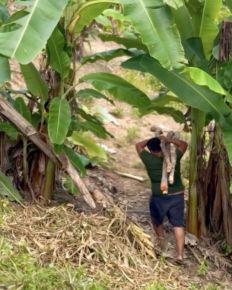
First week volunteering in Thailand ✨

Volunteering on a farm in Croatia🐴

Volunteering in the Thai jungle ✨🍃

Volunteering at a shop in Finland 🌎✨

Get to know billions of people from all over and enjoy Amsterdam
- High demand

Join us at a funky and vibrant Hostel close to Amsterdam!

Campsite Maintenance

Welcome Crew in Amsterdam!

Help volunteer at a women only hostel in Amsterdam
Join the community.
Create a free Worldpackers account to discover volunteer experiences perfect for you and get access to exclusive travel discounts!
How do Worldpackers trips work?
As a member, you can contact as many hosts and travel safely as many times as you want.
Choose your plan to travel with Worldpackers as many times as you like.
Complete your profile, watch the video lessons in the Academy, and earn certificates to stand out to hosts.
Apply to as many positions as you like, and get in contact with our verified hosts.
If a host thinks you’re a good fit for their position, they’ll pre-approve you.
Get your documents and tickets ready for your volunteer trip.
Confirm your trip to enjoy all of the safety of Worldpackers.
Have a transformative experience and make a positive impact on the world.
If anything doesn’t go as planned with a host, count on the WP Safeguard and our highly responsive support team!
After volunteering, you and your host exchange reviews.
With positive reviews, you’ll stand out to hosts and get even more benefits.

- Workinnl - Home
- Inschrijven in Nederland
- Vrije dagen en verlof
- Contract en loon
- Opleiding en integratie
- Wonen in Nederland
- Gezond en veilig werken
- Hulp en ondersteuning
- Werken als zelfstandige
- Ziekte en zorg
- Belastingen en toeslagen
- Informatiepunten
- Relevante organisaties

Working and living in the Netherlands
If you come to work and live in the Netherlands, there is a lot to arrange. This website explains your rights and obligations, what you need to arrange and what agreements you have to make. The information will help you to live and work here healthily, safely and fairly. The website also provides links to the correct organisations to help with any questions you may have.
Holidays and leave
What you need to know about taking days off and getting leave
Registering in the Netherlands
At your municipality or at an office for non-residents
What to do if you are dismissed
Contract and wages
Know what you earn for your work
Working healthily and safely
Work under the right conditions
Help and support
Which organisations can help you with problems you may face in the Netherlands?
Illness and healthcare
What you need to know about healthcare in the Netherlands
Living in the Netherlands
What you need to know for living here safely and fairly
Training and integration
What are the options for learning the Dutch language and receiving further training?
Travel between home and work
What is involved in travelling to and from your work
Taxes and surcharges
What you need to know about Dutch taxes and allowances.
Self-employment
What do I need to do if I want to work as a self-employed person in the Netherlands?
Can't find what you're looking for?
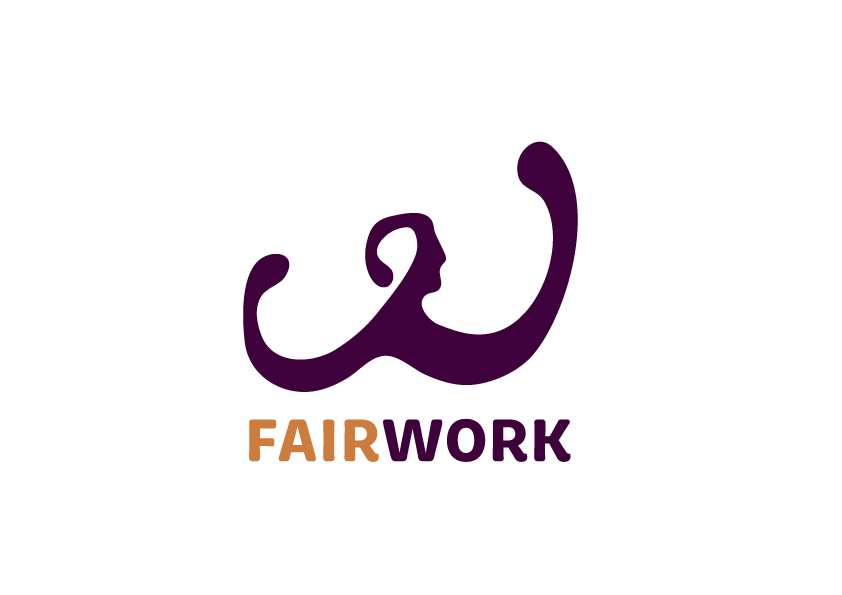
> Contact > About Workinnl
Over deze site
> Privacy > Cookies > Accessibility > Report a vulnerability > Copyright
- Terms of use
Cookie settings
- Toegankelijkheid
- Kwetsbaarheid melden
This website uses cookies. Read more about cookies in our cookieverklaring .
These cookies never collect personal data and are necessary for the correct functioning of the website.
These cookies collect data so that we gain insight into the use and can further improve this website.
These cookies are used by providers of external content that can be displayed on this website. For example video, marketing- and/or tracking cookies.
- Join as a Workawayer
- Join as a host
- Buy a gift membership
Homestays, Volunteering & Working Holidays in Netherlands
Important information about visiting: netherlands.
Meaning of the colours:
By default (toggle switch to the left) hosts who have both yellow AND green indicated for the months you have selected will be shown. If you move the toggle to the right ONLY hosts who have indicated green will be shown.
Meaning of this:
By default (toggle switch to the left) will show hosts who have ANY of the months you have chosen marked as available. This means that some of the months might be marked red (no availability.) If you need to see ALL of the months you have selected as available move the toggle to the right.
Netherlands
Netherlands
Inspiration from around the world
United States
Greece
New Zealand
Portugal
India
Your next adventure begins today
Join the Workaway community today to unlock unique travel experiences with over 50,000 opportunities around the globe.
Forgotten your password?
Workaway has committed over $20,000 USD from the Workaway foundation to help refugees from Ukraine.
Upon request all workawayers based in Ukraine will have their accounts extended for free until further notice.
Hosts in Ukraine have been temporarily disabled for safety reasons.
If you are a host and are able to take in refugees please add the information in your account and you will be added to our last minute host list .
Should you wish to donate and help please click here .
Working holiday residence permit
A working holiday is a cultural exchange programme or scheme (WHP or WHS) for young people aged 18 to 30 from certain countries. The main purpose is to get to know Dutch society and culture. Find out what the requirements are and how to apply for the residence permit.
Requirements
These requirements apply to you.
- Australia
- New Zealand
- South Korea
- You meet the general requirements that apply to everyone .
- For Japan and South Korea: you have a valid pre-registration certificate to take part in the WHP. You can apply for this pre-registration certificate at the Dutch Embassy in Tokyo or Seoul.
- You are at least 18 and no more than 30 years old at the time of the application.
- You previously did not have a residence permit in the Netherlands for the purpose of an exchange.
- You have a return ticket. Or you can show that you have enough money to buy a ticket for the return journey.
- You have enough money to pay for the initial period in the Netherlands. You must estimate how much money you need. You may not receive social benefits from Dutch public funds.
- You have insurance that covers the cost of healthcare in the Netherlands.
- You are coming to the Netherlands for cultural exchange. The main purpose is to get acquainted with Dutch society and culture. You may complete a short study or course during the exchange.
- You meet the requirements for the WHP/WHS set out in the Memorandum of Understanding (MoU) or the Note Verbale of your country. You must, for example, live in the country of your nationality when you submit the application.
- Every year, no more than 100 young people from Argentina, Hong Kong, Taiwan and Uruguay may come to the Netherlands on the WHP/WHS.
- Every year, no more than 100 young people from South Korea may come to the Netherlands on the WHP. A maximum of 200 young people applies to Japan.
Process and costs
A valid provisional residence permit (MVV) is needed for this application
Make sure you meet the requirements.
The application form lists which documents you need. This form is only available in English. Collect all documents before you apply.
Have official documents from abroad legalised and translated into Dutch, English, French or German.
For your application for the residence permit in the Netherlands, you need the following documents:
- a copy of the page in your passport showing your personal details.
- a return ticket/reservation or a bank declaration showing that you have enough money for a ticket back to your country of origin. The bank declaration or reservation must be in Dutch, English, French or German and your name must be on it.
- if you come from Japan or South Korea: a valid pre-registration certificate for participation in the WHP from the Dutch embassy in Tokyo or Seoul is needed. Your personal details and the serial number must be on the pre-registration certificate.
Make an appointment at the Dutch representation for the application for the MVV and the residence permit. For more information on making an appointment see Nederlandwereldwijd.nl .
During the appointment at the Dutch representation
Take the completed application form, your passport photo and your valid passport with you to the appointment. Sometimes you need to take extra documents with you. This is explained in the application form. A staff member of the Dutch representation will register your application and place the application date on the application form. The staff member will also fill in the details of the Dutch representation. Afterwards, you will get the form back. You will receive a confirmation of receipt with your personal V number.
The Dutch representation will also take your biometric data: you will have your fingerprints taken and provide your signature. These data are needed for your residence permit.
Send application to IND
Have you completed the application form in full? And have you collected all documents required? Then send your application with the documents to the IND in the Netherlands. Do this within 3 weeks of the date that the Dutch representation filled in on the application form. The form explains where you need to send the application.
For Japan and South Korea
Apply first at the Dutch representation in Japan or South Korea for a pre-registration certificate for participation in the WHP. Send an email with your name, date of birth and copy of your passport to the Dutch representation. For more information on the pre-registration see Nederlandwereldwijd.nl .
The pre-registration certificate is valid for 90 days. Have you not been able to apply for your residence permit in the Netherlands within 90 days? Then you must apply for a new pre-registration certificate at the Dutch representation.
You will receive your pre-registration certificate by email. Take the email with you to the Netherlands. You can apply for a residence permit in the Netherlands only with this pre-registration certificate.
You can submit the application for the residence permit in 2 ways:
- At an IND desk when you are in the Netherlands. Call the IND to make an appointment.
- In writing by post.
For Australia, Canada and New Zealand
You can submit the application in 3 ways:
- Online. Are you still abroad? Do not submit the application earlier than 90 days before you travel to the Netherlands.
- At an IND desk if you are in the Netherlands during the permit-exempt period. Call the IND to make an appointment.
The application costs € 76,00. For an explanation see the web page about Fees: application costs .
The application form explains how you can pay for the application. Pay the costs within 3 weeks of the date that the Dutch representation filled in on your application form.
The application costs € 76,00. For an explanation see the web page about Fees: application costs .
You will receive a letter explaining how you can pay.
The IND must take a decision within 90 days. This is called a decision period.
We can extend the decision period if it takes longer to decide. For example, because the application is not complete. In that case, the IND will send a message.
You will receive a message with the decision. The decision will be positive or negative.
- Positive decision: you will get an MVV and a residence permit.
- Negative decision: you will not receive an MVV and residence permit. You can object against this decision .
You will receive the decision in a letter. The decision will be positive or negative.
- Positive decision: you will get a residence permit.
- Negative decision: you will not receive a residence permit. You can object against this decision .
You can travel to the Netherlands with the MVV. You collect the MVV from the Dutch representation where you submitted the application.
The MVV is valid for 90 days.
Collect MVV within 3 months of decision
Make an appointment at the Dutch embassy or consulate to collect the MVV.
Valid passport required
When the Dutch embassy or consulate places the MVV in your passport, your passport must be valid for at least another 6 months.
When the residence permit is ready at an IND desk, you will receive a letter. You must make an appointment to collect it. Make an appointment to collect the residence document .
When the residence permit is ready at an IND desk, you will receive a letter. You must make an appointment to collect it. Make an appointment to collect the residence document .
Application forms
Written application forms, online application form working holiday, the residence permit, find out what else you need to know about the residence permit:, working with the residence permit.
It says on the back of your residence permit: ‘Work permit not required for occasional work while on WHP/WHS, other work not permitted’ (in Dutch: TWV niet vereist voor incidentele arbeid in het kader van WHP/WHS, andere arbeid niet toegestaan).
Occasional work means that you are allowed to work only to financially support your stay in the Netherlands. Then your employer does not need a work permit (in Dutch: tewerkstellingsvergunning or TWV) for you. You may, for example work fulltime, but not the whole year for the same employer. Nor may you work as a self-employed person. This is because the main purpose of your stay is cultural exchange.
Legal obligations
You have an obligation to provide information. This means that you must notify the IND of changes in your situation.
Read more about your obligation to provide information.
The IND checks whether you meet your obligations. If you do not, you may get an administrative fine .
Validity of the residence permit
The residence permit for a working holiday is valid for a maximum of 1 year.
Other applications
You cannot extend the working holiday residence permit. Has your residence permit been damaged, lost or stolen? Then have your residence permit replaced. Visit the web page residence permit damaged or change of details or residence permit lost or stolen .
- Living in the Netherlands
- Travel and return visa (TKV)
- Brochure Coming to the Netherlands for exchange 3088 (PDF, 621.64 KB)
Language selection
- Français fr

Work and travel in Netherlands
Choose another destination

How to apply
Who can apply.
To work in the Netherlands through the Netherlands-Canada Youth Mobility Agreement, you must:
- be a Canadian citizen
- be 18-30 years old (inclusive) for the Working Holiday program
- be 18-30 years old (inclusive) for the Young Workers Exchange program
- live in Canada when applying, and
- have a valid Canadian passport
Other requirements may apply. Check Netherlands website for more details on the Working Holiday program or the Young Workers Exchange program .
What type of work visa do I need?
If you’re applying for the Young Workers Exchange program, you need to apply for a Single Permit . The main purpose of your stay must be to gain work experience. You must be a post-secondary student or have graduated less than 12 months ago.
If you’re applying for the Working Holiday program, you need to apply for a residence permit . The main purpose of your stay must be to get to know Dutch society and culture.
Do I need a formal job or internship offer?
Yes, you need a job offer (pre-arranged contract of employment) or formal internship offer if you apply to the Young Workers Exchange program.
No, you don’t need one if you apply for the Working Holiday program.
How long can I stay and work?
Working holiday program.
You can stay and work in the Netherlands for up to 12 months under the Working Holiday Program. You can’t extend your residence permit through the Working Holiday Program.
Young Workers Exchange Program
You can stay and work for 12 months.
You can participate in both programs once.

Start your Adventure
About the netherlands.
Did you know that Holland and the Netherlands are actually not the same? The Kingdom of The Netherlands has 12 provinces, only two of which, South and North-Holland, make up Holland. The Netherlands is extremely flat with a quarter of its surface below sea level. It offers a unique set of landscapes, including rivers, canals, polders and dunes. Smaller than Nova Scotia, the Netherlands is a very densely populated country with a temperate maritime climate, with cool summers and mild winters. You can easily immerse yourself in the Netherlands by biking pretty much anywhere. Visiting Amsterdam’s elegant canals, world-class museums and vibrant nightlife are a must. Other cities such as Rotterdam and Utrecht each have their own, unique attractions and are also worth exploring.
The Dutch economy is stable, healthy and very active in global trade. The business structure in the Netherlands is characterized as being flat in terms of hierarchy levels which helps to foster productivity among teams in the workplace.
The Netherlands has two official languages, Dutch and Frisian. However, the average Dutch citizen speaks more than 3 languages and over 90 percent of the population is fluent in English.
The best way to make sure your trip is the experience of a lifetime is to plan. Review our travel checklist to find out what you should know or do before travelling to and working in a foreign country.
Before you leave, remember to register as a Canadian abroad to receive notifications in case of an emergency while you are abroad or of a personal emergency at home. The service also enables you to receive important information before or during a natural disaster or civil unrest.
Need help planning? One of IEC’s recognized organizations might be able to help you find a job, transportation, and provide travel advice.
Most recognized organizations charge a fee for their services.
Tourism Netherlands
Check for travel advisories
Living and working in the Netherlands
Safety and travel advice for 2SLGBTQI+ travellers
Start your application
You can apply to a Dutch embassy or consulate in Canada. You can also apply to the Immigration and Naturalisation Service (IND) if you are already in the Netherlands.
Apply for the Working Holiday Program
You can apply to a Dutch embassy or consulate in Canada or your employer can apply directly to the IND .
Apply for the Young Workers Exchange Program
Countries/territories
Select a country/territory:
- Czech Republic
- Korea, Rep.
- Netherlands
- New Zealand
- Switzerland
- United Kingdom
Page details
Work in the Netherlands 🇳🇱
A year-long work programme that allows you to fully explore the Netherlands and earn some really interesting money in six months. We offer numerous positions to choose from. Most positions relate to the Amsterdam Schiphol Airport and are suitable for both men and women.
Within six months, you will have career growth and the opportunity to extend your program indefinitely.


What can you expect? ✍️
- Interesting work at an airport where you will be part of the daily operations of Europe's third largest airport
- The Amsterdam Schiphol Airport is also ultra-modern and you will be able to gradually discover all its gadgets and operate interesting machines
- Regular weekly wage ( earnings from €2,000 /month depending on hours worked)
- Dutch labour law benefits and collective agreement system (up to 200% for holidays, 130-150% for weekends, 125% for nights, + 8% “holiday money” of the total amount earned after the end of the job)
- Guaranteed start within three months since your application date
- Provided certified shared accommodation (but you can also arrange your own accommodation)
- Coordinator and team of colleagues from your country
- Transport or adequate compensation for transport to the Netherlands
- Job placement contract and accommodation in your country before departure to NL
- No agency mediation fees
What we expect from you ? 🤙️
- Ability to communicate in English
- Driver’s licence is a great advantage
- Time flexibility, responsibility
- Independence
- Desire to work and gain new experiences
Easy, right?
Sounds great, doesn't it? What will be your first steps?
First, complete the non-binding application form here on the website and then we will give you all the necessary instructions. You will need to apply for an airport security clearance and once this is completed you can move to the Netherlands, where you sign your contract immediately after settling in, followed by collecting your work permit and two days of training.
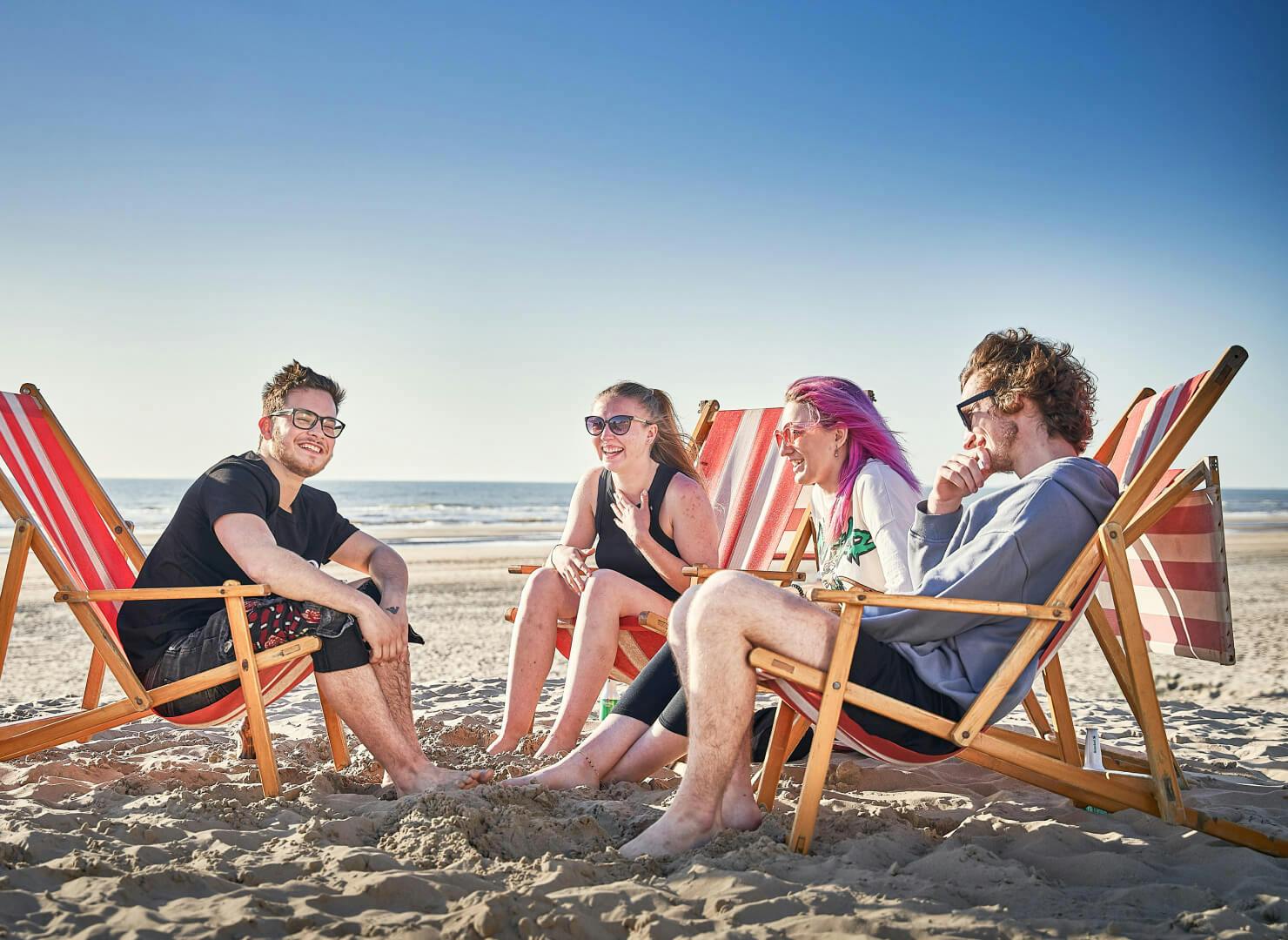
You may start in three months . So what are you still waiting for?
Interested in an early start? You can choose one of our positions outside Amsterdam Schiphol Airport, where you can start almost immediately, and after three months you can start at Amsterdam Schiphol! Just write us a note saying you would like to start early.
- International
- Politics & Society
- Photo Report
- Relationships
- Learn Dutch
- Attractions
- Restaurants
- Scheveningen
- International Travel
- Bank for Internationals
- Dutch Language School
- International School
- Recruitment Agency
- Relocation Service
- Real Estate Agencies
- Tax Accountant
- Mortgage Advisor
- Psychologist
- DutchReview Team
- Privacy Policy
- Take Down and Notice
- Advertise with DutchReview
- Submit an article
- Editorial Internships
🚀 New feature alert! Find the best businesses for internationals on DutchReview's Business Directory
10 things to know before finding work in the Netherlands as an international
Take notes ✍🏻
Finding work in the Netherlands as an international is not an easy task — we can’t lie.
However, preparing well in advance will help you massively when it comes to sealing your perfect job in the Netherlands.
So, how do you prepare yourself for finding work in the Netherlands as an expat?
Well, as someone who has been there, here are 10 major things you need to know. 🏃♂️
1. Finding a job in the Netherlands is hard
I’m going to be honest here first and foremost:
Is finding a job in the Netherlands hard for international folks?
Hell yes, it is. 😬
Combine learning about a whole new job market with being in one of the most densely populated countries in Europe (so you’ve got a lot of competition), and you’ll see that finding a job in the Netherlands is no simple feat.

Talk to any international in the Netherlands, and they’ll all tell you the same — the struggle is real .
However, that’s certainly not to say all hope is lost and you’ll never find a job in the Netherlands.
There are plenty of Dutch companies that hire internationals . Expats become employed every single day, and some are even lucky enough to score a job the first time around.
It’s important to understand that finding a job in the Netherlands is difficult — but certainly not impossible.
2. You don’t always have to speak Dutch when working in the Netherlands
Struggling with Dutch and think you have no chance? No worries.
Naturally, being fluent in Dutch opens up many opportunities, but if you’re new to the Netherlands, you can still get a job.
Many international companies work only in English, and some companies even ask for other languages, such as French and German instead.

So before you start breaking down in tears over that failed Duolingo attempt, start searching for those international jobs here in the Netherlands.
Now you can breathe a sigh of relief (in English)!
Want to find jobs in the Netherlands in English, German, French, or another language? On Undutchables , you can search by your preferred language to find your dream Dutch job.
3. You don’t have to be living in the Netherlands to find a job (but it’s easier if you’re here!)
It’s not unheard of for an international to secure a Dutch job from overseas, particularly for sectors in high demand, like engineers, tech, and health professions.
After all, interviews can be done online, or some companies will even fly you over on their own dime if they think that you’re a great fit.
If you’re not in an in-demand field, you may have a much harder time (or have to shell out for some plane tickets and a hotel to attend your interviews).
4. Some recruitment agencies in the Netherlands actively seek out internationals
What surprised me during my search for work was that some recruitment agencies exist purely to seek out internationals and help them find employment.
The recruiters then match you with companies in the Netherlands that are looking for your specific skillset. Sometimes, the company will offer you a contract directly, but often, the agency will place you in the workforce on an agency contract at first.
Usually, once your contract with the employment agency ends you can be directly employed by the company if you’re the perfect fit.

You don’t have to pay a fee for these recruitment services either, which makes it even better!
It all just makes sense — and with online recruitment, you can do it from the comfort of your own home and have many different jobs at your fingertips.
When applying through Undutchables Recruitment Agency , the same applies. If there isn’t a job out there for you, you can arrange for them to notify you when something relevant pops up, and then you can apply. A colleague’s partner got his current job when first arriving in the Netherlands through Undutchables and is still in the job years later!
5. You need to prepare well in advance
Preparing in advance is key if you’re planning on working and living in the Netherlands. Sorting out that work visa should be at the top of the list (if you’re an EU national, you can skip this step; you’re all good).
This, along with booking an appointment to register at your local municipality, keeps everything legal.
Opening a bank account should be one of the next steps, and you have a couple of options when it comes to choosing a Dutch bank and opening a Dutch bank account so you can collect your new Dutch salary.
You can even open a bank account before you arrive in the Netherlands !
Also, be aware that if you are working and living in the Netherlands, you must take out Dutch health insurance — this is compulsory.

We know what you’re thinking: there’s so much to organise.
We understand, but it’s worth it, and let’s help you set up! Here’s a checklist to get you started:
- Sort your visa/work permit
- Find a place to live AND find a job (that’s easy, right?)
- Register at your local municipality
- Open a bank account
- Sort your Dutch health insurance
6. The CV and interview process in the Netherlands may be different from what you’re used to
Scoring a job in the Netherlands by perfecting that CV/resume and attending that dreaded interview may be different from what you’re used to, depending on where you’re from.
In the Netherlands, I learned that CVs should not be longer than two pages. You also don’t have to include your picture on your CV; however, many people still do this (insert awful passport-style photo here).

The interviews are just as nerve-wracking as in other countries, but all follow a similar structure.
Dressing for an interview depends on the job you’re applying for, and dressing for interviews in the Netherlands is certainly lax compared to other countries.
For example, in the UK, you are generally expected to go full suit and tie with polished shoes. Whereas in the Netherlands, it’s important to look smart, but you don’t have to go overboard.
7. Working from home is common in the Netherlands
This article was brought to you by me, sitting in my bed with a cup of hot chocolate, and that’s not unusual — even before the pandemic years.
Working from home can be a common practice for some workplaces, and I personally love it.
The Dutch workplace is known for being less rigid when it comes to working. Generally, if you need to be at home, depending on your job, you can spend that one less day at the office and work from the confines of your own home instead.

The Dutch value their hard work, but also their spare time too. Working doesn’t have to be at the office and living doesn’t have to just involve work.
READ MORE | 7 ways a Dutch job is different
Many people (especially women) work part-time in the Netherlands and/or work mainly or solely from home. So, if you like the idea of a home office, then you may have just gotten lucky. Gezellig!
8. You need to get your head around the tax system
The Netherlands is known for its notoriously high tax on almost everything.
Before you start working in the Netherlands, you need to be aware of what contributions you need to make, how much you’ll actually get paid, and what rights you have when working in the Netherlands.
Many expats choose a tax accountant in the Netherlands to process their yearly tax return — it’s worth it!
❓ How much income tax will I pay in the Netherlands?
In 2024, all people working in the Netherlands must pay at least 36.97% in income taxes (including national insurance contributions) if they earn under €75,518.
If you earn above this amount, you must pay €49.50% of your salary in income tax.
This will be deducted from your pay before it is paid out to you. You will also have to pay additional taxes if you are particularly wealthy and/or have a large amount of savings.
9. Your travel costs are normally covered by your company
Most companies will reimburse you for your full travel costs monthly, so you don’t have to worry about a long commute eating up half of your wages.
Many other companies offer other reimbursements, such as paying a percentage of your gym or club memberships, to encourage their employees to stay healthy physically and mentally outside of the workplace.
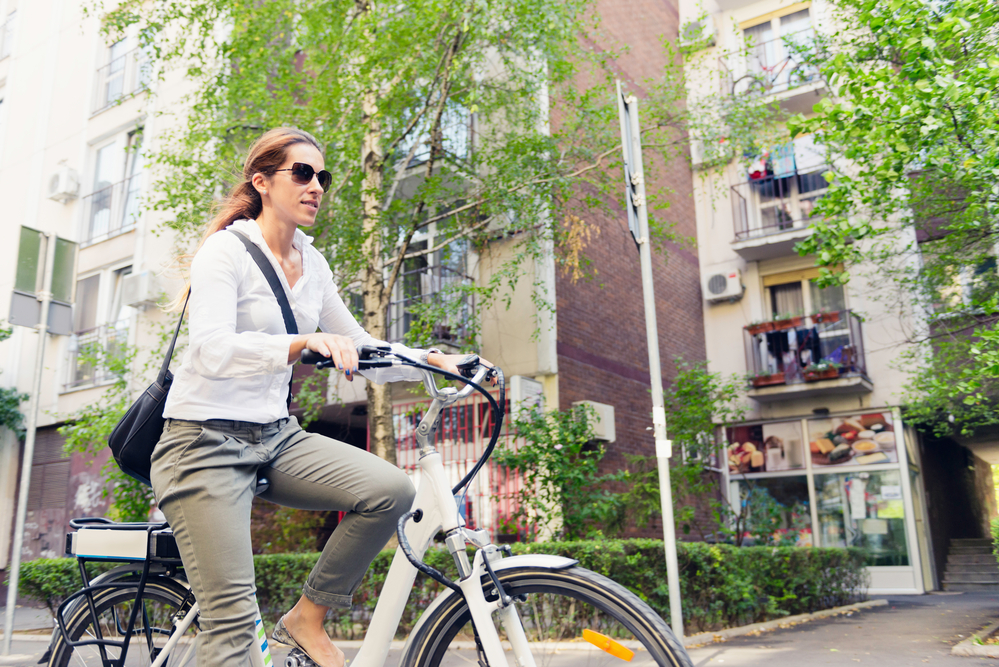
Other companies offer bonus money if you don’t call in sick (not always great when you’re forcing yourself to go in and infecting everyone), but it encourages the workforce not to be tempted to call in sick for silly reasons.
In my experience, companies in the Netherlands treat their workforce very well, and you will be rewarded for your hard work. If not, it’s time to change that job of yours.
10. Borrelen makes everything worth it
Who doesn’t love a free beer and some bitterballen after all that “finding a job and starting a new job” stress? Well, this is something you’ll enjoy at many Dutch workplaces.

Usually, towards the end of the week, either once per week or per month, you and your colleagues will go borrelen .
This is where you’ll have an opportunity to stop working (always nice) and engage in awkward conversations with your coworkers over a beer and some bitterballen.
Great for reducing that work stress as, in general, it’s always good fun — not so good for that waistline, but at least all that cycling will help. Proost! 😉🍻
Are you looking for work in the Netherlands as an international? Or do you have tips? Share in the comments below!
Liked it? Try these on for size:
The 8 greatest forests in the netherlands for a nature escape, studying in breukelen: everything you need to know, how to open a bank account in the netherlands: the ultimate guide, what do you think, 26 comments.
Good morning. Currently I am staying and working in India and want to migrate to Netherlands in 2020.
I have 7+ years of substantial experience of working with dutch insurance portfolios (a.s.r., NN, Delta lloyd). Especially handling payouts that includes complex processes such as Afkoop, Exporatie etc.
Because of sustain consistant performance over a long run I travelled to Netherlands (sponsored by my current working organisation) 3 times i.e. in 2015 (Utrecht); 2017 (Rotterdam) and in 2019 (Amstel) on work permit. And live almost for 6 months.
Now I want to settle in this beautiful, peaceful and secured country. Therefore required your kind assistance in finding out a permanent job. My planning to migrate in Netherlands probably in next year. Please advise me about your procedure.
Kind regards, Harshad Bhamare
Is a 72 years aged person eligible for a teaching job?
Really interested in working in Netherlands but seems I have no direction on where to start, what scares me that very job I look at ask for fluent in Dutch language which I don’t have, also having history working in the South African banking industry and know the positions available I still don’t qualify because each application comes back not suitable candidate. What can I do differently.
Love this article. However i am actually hopeless already. I tried to send so much CV online. And i really really wanted to work there as a healthcare professional.
Hi, I like this script, how can i immigrate with my family and work in netherland. As a driver or assisttance cheff. thank u.
Andy I am wanting to know more, I have been in the South African police for thirty years and have a lot of experience in different fields. I also completed a online TEFL course. What is my chances of finding a job in the Netherlands? I am in position of passport, not married which makes it easy to go and work and stay in the Netherlands if need be. Please can you give me guidance?
Hallo, how can a civil engineer Construction rm pakistan to get a job în Nederland if he aplly already 2 years and The answer îs always:thanks from your e mail. All we need a chance!!!!!!
I would like to relocate to Netherlands. I have to start from bottom. I need a job and schools for my two children. I’m not married. To start the process and get information will be great. I would like also help with my CV so I can start to sent to recruiters or agencies. I think it will be much better leaving my country(Namibia) with a work permit. For more information do not hesitate to contact me. +264816702945
Hi I need anything like jobs
Great guide , i really enjoyed reading it. It is currently helping me with finding a job in the Netherlands . I feel obliged and slightly nervous to inform you about a tiny error i found on this site . Right below the picture with the lady in the 7 th step “working from home …” It says : “Everyone needs to work from home sometimes — even if it’s just because the want to! Image: Anastasia Shuraeva/Pexels”. What it should be is ” even if it’ just because they want to! ” , Its a missing (y) in they. I wish i could word this reply a bit better but its because i dont have lots of experience , sorry .
Thank you very much
Thanks Assed, we have fixed this! 🙂
I have been called couples of times by recruitment agencies for positions but unfortunately I don’t have work permit which they based as a criteria.
I really appreciate the effort you made for energetic and creative international job applicants to change the life of his/her families by enjoying cultural differences, I got chances and experiance working together with some dutch individual’s in my homeland Ethiopa i experienced work hard, honesty and understanding cultural differences. Coz of my former business type i had travel history to Europ 2 times 2017 and 2019 to participate in Fair trade. Currently i am in uganda for looking job opportunities i am trying to check different online job opportunities but its not easy to find the right one i hope your company guide me to job opportunities i have 8 years experiances on tour guide (Hotel and tourism, small team coordination and management also i had good driving skill, i am graduated BA Degree with Leadership and Management in addition i had Diploma with Chemistry Teacher. for begining would like to be participate on Agricultural, packaging, delivering services. I would like to thanks on behalf of my lovely boy and family for effort you made for betterment of our life. Estifanos Nega +256708468120 My Uganda number and Alexandra Smeets Netherland Former partner and My Dutch family
Thanks very much for your orientation on how to acquire a sponsered job in the country. Am a Ghanaian health worker with Diploma in Health information, who has 3years experience in the health sector. Do I qualify. It’s my dream of relocating some day. Any advice.
Goodmorning, currently I am staying and working in Africa and I want to migrate to Netherlands in December 2022. Please I want know how possible it is.
Am currently in Africa,am searching for a job sponsorship company in Holland
Hi, i am looking for a suitable job in education field in Netherlands….anyone can help me in this regard.
I really appreciate the effort for availing this knowledge to us. Is there any exclusive recruiting agencies for health care industry. Because I did not find any option for health in unduchables.
If any Indians in Netherlands , is it easy to get a job in Netherland
Hi. I have worked in the Uk for 34 years with Royal Mail. I am looking for an adventure in my life working in a country that has a happy working environment where a work life balance matters and to be a safe and lovely country. How hard would it to gain employment within the Dutch postal service?.
Best of luck .. Go for it. So many letterboxes are outside the main entrances of the buildings.
All the roads pavements and cycle paths primed for getting about at your own pace depending be it leisurely or on a mission.
I love it and if it had Mediterranean winters. The place would be perfecto.
Really useful. Hope you’re still loving it there.
For me it’s such an amazing country, visiting regularly and thinking of moving back because of the relative consistency of life there and well thought out infrastructure.
Good evening,I like the script but I will like to work as a care giver in Netherland I can I do it to stay and work there
I am a Mechanical Engineer. My working experience 17 years in related field. I am looking for a job at Netherland.requesting to get help.
Thank you for your tips, don’t forget to mention, that a standard full-time job in the Netherlands is between 36 and 40 hours a week, which comes down to seven or eight hours a day, five days a week. A job is considered to be part-time when you work anywhere between 12 to 36 hours a week. Dont forget to make a topic about the Niksen too, WE Europeans are not entitled to the Wasp culture of work/obey/consume, we like to chill and and just do nothing, Unlike the Goddess of Victory….
Hi every one I am Lim I from myanmar and i looking for a chef job at netherland. I work before manaysia for 10 years and work at myanmar Social Enterprise Training restaurant as a Head chef and leading a project for 8years. In the current situation all business going down and diddicult to suvrice for family and not really secure so i am looking for the new job like a Chef Sous chef. And i would like to learnmore culinary school Any one have a vaccines please contact me as soon as you can a following email [email protected]
LEAVE A REPLY Cancel reply
Save my name, email, and website in this browser for the next time I comment.
This site uses Akismet to reduce spam. Learn how your comment data is processed .
The latest Dutch news. In your inbox.
Woah, you look pretty good here.
We're constantly hunting for the latest, greatest, and most Dutch spots for our readers. Want your business to reach an unrivalled expat and international audience?
We like you - a lot
© 2023 All Rights Reserved. All material on this website (DutchReview) is strictly copyright and all rights reserved. If you are dissatisfied with the website or any content or materials on it, your sole exclusive remedy is to discontinue your use of the website. The website may provide links to other websites on the Internet, the content of which is not in our control. Whilst every effort has been made to ensure accuracy, the publisher cannot accept responsibility for omissions and errors. If you have found material on this website which is copyrighted by others, please contact the webmaster on this matter in order to have it removed.
What you need to know when you travel to the Netherlands
News item | 20-08-2021 | 10:28
There are certain things you need to know if you’re planning to travel to the Netherlands during the current pandemic. In this article Conrad van Tiggelen, director of strategy and branding at the Netherlands Board of Tourism and Conventions , helps fill you in so you can properly prepare for your trip.
What is the current situation in the Netherlands?
‘The Netherlands has re-opened for the most part. Some basic rules still apply, however: avoid busy places, stay 1.5 metres away from other people, wash your hands often and – if you have symptoms – stay at home and get tested. Face masks are no longer required in most public spaces. Public transport is the only exception: everyone aged 13 or older must still wear a face mask at stations and airports, on trains, buses and ferries, and in taxis.’
Is the Netherlands ready to welcome foreign tourists again?
‘Absolutely. The Netherlands is a welcoming country and is looking forward to receiving tourists in a safe, responsible way. We’ve missed having visitors from abroad and are excited for their return. The Dutch are always happy to put their knowledge of other languages to use to help foreign visitors.’
What do tourists need to bear in mind when travelling to the Netherlands?
‘Exactly what you need to bear in mind when travelling to the Netherlands depends on where you’re travelling from, how you are travelling and whether the country you’re travelling from is on the list of safe countries and regions.’
See the information below and this checklist for more about travelling to the Netherlands from abroad.
Find out whether you are required to self-quarantine and what documents you need when you travel via the check on reizentijdenscorona.rijksoverheid.nl . It will give you a personal travel overview, based on your travel details.
Travelling from within the EU/Schengen area
See the list of safe countries and regions in the EU/Schengen area .
- You are travelling from a place that is on the list of safe countries/regions: you may travel to the Netherlands. You do not need proof of vaccination, proof of recovery or a negative COVID-19 test result. You do not need to self-quarantine. You are, however, advised to get tested or take a self-test after you arrive.
- You are travelling from a high-risk area: you may travel to the Netherlands. If you are 12 or older you must have a Digital COVID Certificate (proof of vaccination, proof of recovery or negative COVID-19 test result) . You do not need to self-quarantine. You are advised to get tested or take a self-test after you arrive.
Travelling by air
If you are 13 or older and are travelling to the Netherlands by air, you are required to complete a health declaration form. Download the health declaration form here .
Travelling from outside the EU/Schengen area
See the list of safe countries and regions outside the EU/Schengen area .
- You are travelling from a place that is on the list of safe countries/regions: you may travel to the Netherlands. You must show proof of vaccination or a negative COVID-19 test result. You do not need to self-quarantine. You are, however, advised to get tested or take a self-test after you arrive.
- You are travelling from a high-risk area: an EU entry ban is in place for people travelling to the EU/Schengen area from places not on the list of safe countries and regions. Generally speaking you may not, therefore, travel to the Netherlands – although certain exceptions do apply. Find out who is exempt from the EU entry ban and may travel to the Netherlands. You must show proof of vaccination or a negative COVID-19 test result. You do not need to self-quarantine. You are advised to get tested or take a self-test after you arrive.
- You are travelling from a very high-risk area: you are required to show a negative test result and to self-quarantine. When arriving in the Netherlands after a stay in a very high-risk area, you must self-quarantine for 10 days – this applies whether or not there is a virus variant of concern in that area. And it applies even if you have proof of vaccination or proof of recovery. If you get tested on day 5 you can shorten your quarantine period.
If you are 13 or older and are travelling to the Netherlands by air, you are required to complete a health declaration form. Download the health declaration form here.
Type of negative COVID-19 test result required when travelling to the Netherlands
If you need a negative COVID-19 test result to travel to the Netherlands, it must be from either a NAAT (PCR) test conducted no more than 48 hours before your departure or an antigen test conducted no more than 24 hours before your departure. There are additional measures if you are travelling from a high risk area. Find out more about test result requirements here.
Changing planes in the Netherlands
If you change planes in the Netherlands and you board your connecting flight within 24 hours without leaving the airport in the meantime, you do not need to show a negative COVID-19 test result. If, however, you are travelling from a very high-risk area you must have a completed and signed quarantine declaration form with you, even if you have been vaccinated. Download the quarantine declaration form here.
If you are 13 or older and travelling to the Netherlands by air you are also required to complete a health declaration form, even if you are only changing planes. Download the health declaration form here .
Please note that in some cases you may require an airport transit visa .
You are travelling through the Netherlands by car/motorcycle and will be in the country for less than 12 hours
If you will be in the Netherlands for less than 12 hours you do not need to show a negative COVID-19 test result. If, however, you are travelling from a high-risk area you must have a completed and signed quarantine declaration form with you. Download the quarantine declaration form here.
What should tourists bear in mind while they are visiting the Netherlands?
‘You can have a great holiday in the Netherlands. Hotels, camp sites and holiday parks are all open. There may, however, be additional rules in place. Shops, museums, amusement parks and other sights and attractions are also open, but you may need to book tickets in advance. Make sure you find out ahead of time what rules apply at your accommodation and any locations you want to visit.
Restaurants, cafés and bars are open, although guests must be assigned a seat and everyone must keep 1.5 metres apart. Establishments serving food and drink may not stay open past midnight or open before 06.00 in the morning. Nightclubs and similar venues are currently closed.
Multi-day events with overnight stays are not permitted before 20 September. One-day events are permitted subject to certain conditions. Event organisers may request that you show a COVID certificate to enter – for this the Dutch CoronaCheck app is required.’
What should tourists do if they become ill while in the Netherlands?
‘Stay in your accommodation and do not leave except to get tested. You can make an appointment to get tested by calling 0800 1202 (or +31 850 659 063 if you’re calling from a foreign phone) between 08.00 and 20.00. COVID-19 tests are free of charge in the Netherlands at all test locations run by the municipal health services (GGD). If you test positive for COVID-19, follow the instructions given to you by the healthcare professionals. If your symptoms are life-threatening, call the Dutch emergency number 112.’
What should foreign visitors bear in mind before leaving the Netherlands to return home?
‘Many countries consider the Netherlands to be a high-risk area. Your home country may therefore require you to show a negative test result when you return. Before leaving the Netherlands, always check the latest rules for entering your home country.’
Do you have any additional tips for holidaymakers travelling to the Netherlands?
‘There is a lot to explore in the Netherlands within a relatively short distance. Avoid busy places and seek out different adventures. Stray from the beaten path and discover some of our country’s lesser-known spots. Do as the locals do and explore by bike, for example. There are many places in the Netherlands where you can rent bikes (including e-bikes). Visit Holland.com for inspiration.
Another option is to take in Dutch culture in our museums, many of which now offer reduced admission. If you are planning to visit several museums, the Netherlands Museum Pass could be a good option for you – it offers unlimited access to more than 400 museums across the country. Due to the restrictions in place, museums may require you to book tickets. You should therefore plan your visit in good time to be sure you can get in during your stay in the Netherlands.’

- Jobs Abroad
- Western Europe
- Netherlands
Jobs in the Netherlands
When considering working abroad in Europe, does the idea of working in a highly progressive nation attract you? If so, then the Netherlands might be just the place for you to find a job abroad. Home to lazy canals, an unparalleled art scene, some of the best museums in the world, and of course, Heineken, the Netherlands provides the perfect place to make a home abroad. From Amsterdam to Rotterdam, the Netherlands is an international hub full of job opportunities for individuals from all different kinds of backgrounds.
Made infamous for its daring cultural traditions, wooden shoes, and flowing, flowery meadows, among other things, the Netherlands offers much more than job opportunities. Nestled between some of Europe’s most prominent economies, both Belgium and Germany, working in the Netherlands will surely be a beneficial career move and the chance to experience the European marketplace and business world.
Amsterdam . The capital of the Netherlands is a city full of contrasts. While those looking to party will find their home here, more importantly, there is a place in Amsterdam for those looking to keep it classy. The misunderstood, yet stereotypical, raunchy side of Amsterdam is kept under wraps near the train station while the real “Dutch” Amsterdam keeps to itself along the beautiful canals. If you’re looking for a home in one of the world’s greatest art hubs, Amsterdam is home to not only the Van Gogh museum, but also Vermeers and Rembrandts at the brilliant Rijksmuseum. So whether you’re looking for a job in the Netherlands that supports a bit of letting loose on the weekends or even one that allows for more of a quiet lifestyle, Amsterdam offers job opportunities for both types of people.
Rotterdam . Home to the biggest port in Europe, Rotterdam, known as the second city of the Netherlands and the Manhattan of the Maas, is one amazing place to live and work in the Netherlands. Bombed brutally during World War II, this Dutch coastal city is a testament to Dutch engineering and resiliency. Having been restored with a modern touch, Rotterdam is a city of steel and glass skyscrapers that gives off a definitive 21st century feel that is aesthetically pleasing. Those looking to work in the Netherlands in a modern city with access to the ocean, Rotterdam is the place for you.
Maastricht. One of the most quaint cities in the Netherlands, living and working in Maastricht will be a big contrast to Rotterdam or Amsterdam. Those who choose to work in Maastricht will learn that biking beats driving and walking beats biking, which is also true in other cities in the Netherlands. Known historically as the birthplace of the European Union, created in the Maastricht Treaty, Maastricht is an incredibly beautiful place to live. Home to Roman ruins, food from all over the world, and a surprising French influence, the crown jewel of the southern Netherlands is a great place for those seeking a place that is quiet, picturesque, and literally a short walk away from Belgium and Germany.
Besides just being a great place in general, the Netherlands is home to a plethora of opportunities for foreigners looking to work abroad. Outlined below are a couple of jobs in the Netherlands that are great for people from a variety of backgrounds. The biggest thing to keep in mind is the kind of experience you are looking to have and what kind of experience you already have. Based on these two questions, you’ll be able to find the perfect job in the Netherlands for you.
Au pair . A popular job throughout all of Europe, au pair jobs in the Netherlands offers steady pay, which is negotiable depending on the family you work for. Most au pair jobs offer two days off per week with a minimum of 30 working hours. What is unique about being an au pair is that most au pairs live with the family they’re working for, can take optional Dutch language classes, and get a true immersion experience and feel for Dutch culture. With a little housework typically added to an au pairs to do list, au pairs are generally responsible for babysitting, being a part of the family, and helping out with English language lessons, if required. To qualify for an au pair job in the Netherlands, you just need to be between 18 and 29, have a high school diploma, and have previous childcare experience, along with a commitment of at least 10 months (for most jobs).
Teaching English . One of the easiest and most well paying jobs in the Netherlands, and around the world, are those revolving around teaching English as a second language. Completing TEFL certification courses and teaching English abroad can be one of the most rewarding jobs you can get abroad, and teaching jobs in the Netherlands are no exception. Most teachers work about 30 hours a week, and have about 14 paid vacation days. As one of the most attainable paid jobs in the Netherlands , teaching English as a foreign language is definitely an option worth some serious consideration.
Jobs through Recruitment Agencies. Finally there are a large number of jobs in the Netherlands provided by recruiters. The difference between these jobs, and jobs like teaching English, is that previous experience in your industry of interest is often required. If you have a good amount of experience or an extensive academic background in your field of choice, it is possible to find jobs in the Netherlands in construction, civil and mechanical engineering, web design, and computer science, among other fields, through recruitment agencies or work abroad programs. Each job usually has a set time commitment required, as well as specific benefit packages.
English teachers can expect to make between $400 and $600 a month, with a bit of an increase in salary if you’re teaching in a bigger city. Teacher’s salaries are most definitely enough to cover living expenses, and some teaching jobs in the Netherlands will include additional forms of compensation to help counter the high cost of living (i.e. housing stipend or pre-arranged housing). On the other hand, au pairs typically live with their host family, so the cost of living tends to be extremely low. However, the salaries for au pair jobs are adjusted, with consideration of this huge financial benefit, meaning au pairs may get paid around 300 Euros a month.
In general, the Netherlands is known as a rather expensive place to live abroad. However, this situation was only exacerbated in 2011, with the Euro Crisis, which created somewhat rocky European exchange rates.
As one of the most densely populated countries in the region, rent costs can be quite steep, sometimes costing upwards of 1200 Euros a month for a studio apartment in Amsterdam, for example. For those looking just to rent a room, rent can range from 500 to 600 Euros a month, with prices dropping the farther you go from the major cities.
While the cost of housing can be pretty difficult to get around, as long as you budget and are careful with what you spend your money on, most jobs in the Netherlands will provide a salary that is sufficient enough for you to live a comfortable life.
Accommodation is easily the most expensive part of living and working in the Netherlands. Renting a room in Amsterdam or Rotterdam will be about 550 Euros a month, while renting a studio apartment for yourself will be between 900 and 1200 Euros. Also, keep in mind that housing in rural areas is much more affordable as opposed to metropolitan housing options. As mentioned above, au pairs typically live with their Dutch host families, and can expect all meals to be provided as well as a private bedroom.
Visa requirements to work in the Netherlands differ based on what type of job you obtain. However, if you’re looking to work legally and stay longer than three months, a work visa is required. The Dutch work visa process is easiest for those who decide to work as au pairs. As an au pair, your host family usually responsible for applying for a visa for you and covering the costs associated with the application. As an English teacher, the organization or school that is providing you with a job will help you ensure you follow the required work visa application process. For all other jobs in the Netherlands, foreigners should be prepared to take multiple trips to a Dutch embassy in their home country and fill out an abundance of paperwork. However, work visas are not required for EU citizens who want to work in the Netherlands.
Greeting. One of the hardest things for Americans to get used to abroad is greeting each other via kisses. In the Netherlands, close friends greet each other by kissing them three times on the cheek. If this seems unprofessional, have no fear; kissing in the workplace is not normal, as Dutch will typically shake hands when being introduced for the first time, especially in a work environment.
Punctuality. If you’re hoping to work in a place that is relaxed with time tables, meeting times, and showing up on the dot, the Netherlands might not be the place for you. The Dutch place a great deal of importance on sticking to your schedule and not showing up late to meetings. In fact, tardiness is considered very rude.
Transportation. One of the better known facts about the Netherlands is their level of friendliness toward the use of bikes. In one of the most bike friendly nations in the world, you can buy a great used bike for under 100 Euros and use it as your main form of transportation during your job in the Netherlands. So get ready to get fit by getting yourself to and from work using the most environmentally friendly mode of transport ever!
Affordability. One of the biggest challenges to overcome working in the Netherlands is its affordability It is on average one of the most expensive places to live in Europe, with even a Coke costing about $3. Just stick to where the locals eat or buy food at the store to make your own meals, and you should be fine with a little bit tighter than usual budget.
+ ADD LOCATION FILTER
+ ADD FIELD FILTER
6 Jobs in the Netherlands
Browse programs that match your interests

TEFL Classes + Job Search Guidance to Teach English Online & Abroad

Jump start your teaching career with us and start the experience of a lifetime!

Earn $40+ per Hour with Accredited Online TEFL Courses. How Much Can You Earn?

Best TEFL Course, globally recognized. up to 50% off!

Top Provider of the Month
Get tefl certified & explore the world as a professional english teacher with international tefl academy.
10 1 reviews
Teach Abroad in the Netherlands
Are you interested in teaching abroad in Europe? Teaching in the Netherlands offers interested educators the opportunity to explore rich European culture and a very high standard of living, all while earning a competitive salary. The Netherlands can also serve as a way to expl...
10 2 reviews
Au Pair in Netherlands - Travel, Work and Earn
Our cultural Au Pair program runs for a duration 12 months. We link you up with a friendly host family, so that you can get the authentic feel of Netherlands. Host families provide accommodation (private room in the host families home) and meals throughout the duration of your...
Hopscotch Travel
8.55 11 reviews
Au Pair Abroad with World Voyage
Live, learn, and grow with World Voyage's au pair program! Combine cultural exploration with childcare experience in a beautiful new home. Imagine caring for wonderful children while becoming fluent in another language, exploring vibrant cities, and forging lifelong friendship...
9.4 5 reviews
Au Pair in The Netherlands
This is your opportunity to explore much of the Netherlands and be in awe of its beauty without worrying that you’ll soon end up penniless. Stay in the country for at least a year and serve as an au pair for a local family. This role involves huge responsibilities, mainly cari...
The Cultural Exchange Project
9.5 2 reviews
Creative Content and Media Jobs and Internships
Looking to build your CV with experience in an international setting? The Abroad Connection offers this opportunity and more! Join our team as an ambassador, content creator, journalist, writer, travel blogger, influencer, social media guru, or salesperson. If you’re planning ...
The Abroad Connection
0 0 reviews
Work in the Netherlands (Canadians Only)
Spend a few months working and traveling in the Netherlands! These are paid positions with an arranged work permit and accommodations. Take on full-time seasonal work for 3 to 12 months.Placements center around primarily agriculture and horticultural work. As a trainee, you'll...
International Rural Exchange Canada

Want to Get Matched with Programs?
Video of the month.
Get TEFL Certified & Explore the World as a Professional English Teacher International TEFL Academy Learn More
More Programs to Check Out
Your options are endless
- International TEFL Academy Get TEFL Certified & Explore the World as a Professional English Teacher Premier TEFL Search + Apply for TEFL Internships & Our 100s of Jobs Online & Abroad

Come stay at Home & Co and live the easy living experience

Popular Searches
Here are some popular links curated for you
- United Kingdom
- Hospitality

to get exclusive discounts on meaningful travel programs!
Travel Tools
Hand-picked travel resources for you
Related Jobs Abroad Articles
Read more tips before you travel
10 Reasons Why You Should Au Pair in Europe
10 best places for working in asia & the south pacific in 2018, the busy student’s guide to finding work abroad after graduation, for travelers, travel resources, for partners.

© Copyright 1998 - 2024 GoAbroad.com ®
- Study Abroad
- Volunteer Abroad
- Intern Abroad
- Teach Abroad
- TEFL Courses
- Degrees Abroad
- High School Abroad
- Language Schools
- Adventure Travel
- Online Study Abroad
- Online Volunteer Programs
- Online Internships
- Online Language Courses
- Online Teaching Jobs
- Online Jobs
- Online TEFL Courses
- Online Degree Programs
Security Alert May 17, 2024
Worldwide caution, update may 10, 2024, information for u.s. citizens in the middle east.
- Travel Advisories |
- Contact Us |
- MyTravelGov |
Find U.S. Embassies & Consulates
Travel.state.gov, congressional liaison, special issuance agency, u.s. passports, international travel, intercountry adoption, international parental child abduction, records and authentications, popular links, travel advisories, mytravelgov, stay connected, legal resources, legal information, info for u.s. law enforcement, replace or certify documents.
Before You Go
Learn About Your Destination
While Abroad
Emergencies
Share this page:
Netherlands
Travel Advisory July 26, 2023
Netherlands - level 2: exercise increased caution.
Reissued with obsolete COVID-19 page links removed.
Exercise increased caution in the Netherlands due to terrorism.
Country Summary : Terrorists continue plotting possible attacks in the Netherlands. Terrorists may attack with little or no warning, targeting tourist locations, transportation hubs, markets/shopping malls, local government facilities, hotels, clubs, restaurants, places of worship, parks, major sporting and cultural events, educational institutions, airports, and other public areas.
Read the country information page for additional information on travel to the Netherlands.
If you decide to travel to the Netherlands:
- Be aware of your surroundings.
- Stay alert in locations frequented by large crowds or foreign nationals.
- Follow the instructions of local authorities including movement restrictions related to any ongoing police action.
- Monitor local media for breaking events and adjust your plans.
- Enroll in the Smart Traveler Enrollment Program (STEP) to receive Alerts and make it easier to locate you in an emergency.
- Follow the Department of State on Facebook and Twitter .
- Review the Country Security Report for the Netherlands.
- Visit the CDC page for the latest Travel Health Information related to your travel.
- Prepare a contingency plan for emergency situations. Review the Traveler’s Checklist .
Embassy Messages
View Alerts and Messages Archive
Quick Facts
A passport must be valid for at least three months beyond planned date of departure from the Schengen area . The 12-page U.S. emergency passport is not accepted by Dutch authorities for visa-free entry into the Netherlands.
Two pages required for entry stamp
Not required for stays under 90 days
10,000 Euros or equivalent
Embassies and Consulates
U.s. embassy the hague.
John Adams Park 1 2244 BZ Wassenaar Telephone: +(31) (0) 70 310 2209 Emergency After-Hours Telephone: +31 (0) 70 310 2209 Fax: +(31) (0) 70 310 2207
U.S. Consulate General Amsterdam Museumplein 19 1071 DJ Amsterdam Telephone: +(31) (0) 20 575-5309 (Emergencies involving U.S. citizens only ) Telephone: +(31) (0) 70 310 2209 (All other calls) Emergency After-Hours Telephone: +(31) (0) 70 310-2209 Fax: +(31) (0) 20 575 5330 Email: [email protected]
Destination Description
See the Department of State’s Fact Sheet on the Netherlands for information on U.S.-Netherlands relations.
Entry, Exit and Visa Requirements
COVID-19 Requirements
There are no COVID-related entry requirements for U.S. citizens.
Visit the Embassy of the Netherlands website for the most current visa information.
Traveling Through Europe : If you are planning to visit or travel through European countries, you should be familiar with the requirements of the Schengen Agreement.
- Your passport should be valid for at least three months beyond the period of stay.
- If you plan on transiting a Schengen country, review our U.S. Travelers in Europe page .
- You will need sufficient proof of funds and a return plane ticket.
- For additional information about visas for the Schengen area, see the Schengen Visa page.
Dutch immigration authorities do not recognize the 12-page U.S. emergency passport, issued by U.S. embassies and consulates overseas, as a valid travel document for visa-free entry into the Netherlands. If traveling on this emergency passport, please be aware that you will be refused entry by immigration officials and/or held at the airport until a return flight to the United States is available. We strongly urge U.S. citizens in possession of the 12-page U.S. emergency passport to replace it with a full-validity passport before traveling to the Netherlands by air.
The U.S. Department of State is unaware of any HIV/AIDS entry restrictions for visitors to or foreign residents of the Netherlands.
Find information on dual nationality , prevention of international child abduction and customs regulations on our websites.
Safety and Security
Terrorism: Terrorist groups and those inspired by such organizations are intent on attacking U.S. citizens abroad. Terrorists are increasingly using less sophisticated methods of attack – including knives, firearms, and vehicles – to more effectively target crowds. Frequently, their aim is unprotected or vulnerable targets, such as:
- High-profile public events (sporting contests, political rallies, demonstrations, holiday events, celebratory gatherings, etc.)
- Hotels, clubs, and restaurants frequented by tourists
- Places of worship
- Shopping malls and markets
- Public transportation systems (including subways, buses, trains, and scheduled commercial flights)
Crime: While the rate of violent crime in the Netherlands is low, tourists are often targeted by pickpockets, bag snatchers, and other petty thieves and are active in and around train, tram, and metro stations in city centers; and aboard public transportation, especially to and from Amsterdam’s Schiphol Airport. Thieves often work in pairs: one distracts you, often by asking for directions, while the other moves in on your unguarded property. Use your hotel safe, and keep baggage locked or secured when you are away. Avoid leaving valuables in automobiles, especially electronic devices, such as laptops, tablets, GPS devices, and mobile telephones. Never leave your personal items or baggage unattended.
Most retailers in the Netherlands only accept a “chip and pin” card and will not accept a standard U.S. credit card containing only a magnetic strip. ATM and credit card users are advised to keep an eye on their cards at all times. If you feel uncomfortable using your card for any reason, use cash. Contact your credit card provider for further guidance.
Demonstrations occur frequently. They may take place in response to political or economic issues, on politically significant holidays, and during international events.
- Demonstrations can be unpredictable, avoid areas around protests and demonstrations.
- Past demonstrations have turned violent.
- Check local media for updates and traffic advisories.
International Financial Scams: See the Department of State and the FBI pages for information.
Victims of Crime: Report crimes to the local police at 112 or 0900-8844 for non-emergency cases. See above for contact information for the U.S. Embassy The Hague and U.S. Consulate General in Amsterdam.
Remember that local authorities are responsible for investigating and prosecuting crimes in the Netherlands.
See our webpage on help for U.S. victims of crime overseas .
- Help you find appropriate medical care
- Assist you in reporting a crime to the police
- Contact relatives or friends with your written consent
- Explain the local criminal justice process in general terms
- Provide a list of local attorneys
- Provide our information on victim’s compensation programs in the U.S.
- Provide an emergency loan for repatriation to the United States and/or limited medical support in cases of destitution
- Help you find accommodation and arrange flights home
- Replace a stolen or lost passport
The organization Slachtofferhulp Nederland (Victim Support Netherlands) provides a range of services for victims of crime, traffic accidents or disasters within the Netherlands. For more information, visit their webpage .
Domestic Violence: U.S. citizen victims of domestic violence are encouraged to contact the Embassy for assistance.
Tourism: The tourism industry is well-regulated and rules in regard to best practices and safety inspections are regularly enforced. Hazardous areas/activities are identified with appropriate signage and professional staff is typically on hand in support of organized activities. In the event of an injury, appropriate medical treatment is widely available throughout the country. Outside of a major metropolitan center, it may take more time for first responders and medical professionals to stabilize a patient and provide lifesaving assistance. U.S. citizens are encouraged to purchase medical evacuation insurance .
Local Laws & Special Circumstances
Criminal Penalties: You are subject to local laws. If you violate local laws, even unknowingly, you may be expelled, arrested, or imprisoned. Individuals establishing a business or practicing a profession that requires additional permits or licensing should seek information from the competent local authorities, prior to practicing or operating a business.
Furthermore, some laws are also prosecutable in the United States, regardless of local law. For examples, see our website on crimes against minors abroad and the Department of Justice website.
Arrest Notification: If you are arrested or detained, ask police or prison officials to notify the U.S. Embassy immediately. See our webpage for further information.
Despite common misperceptions, marijuana and hashish are controlled substances in the Netherlands, and although not enforced in defined tourist areas, possession is a crime that can result in a fine. “Coffee shops” are havens for petty criminals who prey on tourists and other individuals under the influence of drugs. Persons who visit “coffee shops” have become victims of pickpocketing, identity theft, sexual assault, and other crimes. Visitors are cautioned against using such substances, as they are often counterfeit and can cause illness or death. It is illegal to take any controlled substance, such as marijuana, into or out of the Netherlands.
Counterfeit and Pirated Goods: Although counterfeit and pirated goods are prevalent in many countries, they may still be illegal according to local laws. You may also pay fines or have to give them up if you bring them back to the United States. See the U.S. Department of Justice website for more information.
Faith-Based Travelers: See our following webpages for details:
- Faith-Based Travel Information
- International Religious Freedom Report – see country reports
- Human Rights Report – see country reports
- Hajj Fact Sheet for Travelers
- Best Practices for Volunteering Abroad
LGBTQI+ Travelers: There are no legal restrictions on same-sex sexual relations or the organization of LGBTQI+ events in the Netherlands. See our LGBTQI+ Travel Information page and section 6 of our Human Rights report for further details.
Travelers with Disabilities : Dutch law guarantees equality and the right to access for people with disabilities. Information about accessibility in the Netherlands for travelers with disabilities is available on the Netherlands main online portal for visitors.
Students: See our Students Abroad page and FBI travel tips .
Women Travelers : See our travel tips for Women Travelers .
COVID-19 Testing: For information about COVID-19 testing in the Netherlands, visit the Dutch Ministry of Health, Welfare and Sport webpage .
COVID-19 Vaccines: The COVID-19 vaccine is available for U.S. citizens to receive in the Netherlands if they are residents. Visit the Dutch government’s COVID-19 page for more information about obtaining the COVID-19 vaccine in the Netherlands. Visit the FDA's website to learn more about FDA-approved vaccines in the United States.
Good medical facilities are widely available in the Netherlands. Pharmacies (“Apotheek”) are widely available and can assist with emergency prescription needs. Some common medications are not available in the Netherlands without a prescription, and some prescription drugs cannot be imported into the country.
For emergency services in the Netherlands, dial 112.
We do not pay medical bills. Be aware that U.S. Medicare/Medicaid does not apply overseas. Most hospitals and doctors overseas do not accept U.S. health insurance.
Medical Insurance: Make sure your health insurance plan provides coverage overseas. Most care providers overseas only accept cash payments. See our webpage for more information on overseas coverage.
We strongly recommend supplemental insurance to cover medical evacuation.
Carry an adequate supply of prescription drugs in their original container in your carry-on luggage. Carry a letter from your pharmacist or medical doctor with you, as some drugs are subject to confiscation by local customs agents. Check with the government of the Netherlands to ensure the medication is legal in the Netherlands. If you are traveling with any pre-existing medical conditions, bring a letter from your physician that describes your medical condition and any prescription medications, including the generic name of any prescribed drugs.
Vaccinations: Be up-to-date on all vaccinations recommended by the U.S. Centers for Disease Control and Prevention.
Further health information:
- World Health Organization
- U.S. Centers for Disease Control and Prevention (CDC)
Travel and Transportation
Road Conditions and Safety:
- Lanes in the center of many urban two-way streets are reserved for buses, trams, and taxis.
- In cities, pedestrians should be mindful of trams and buses, which often cross or share bicycle and pedestrian paths. Serious and sometimes fatal accidents involving pedestrians or bicyclists colliding with trams and buses occur each year.
- Motorists should be especially mindful of the fact that bicyclists have the right-of-way; motorists must yield to bicyclists.
- Pedestrians should not walk along bicycle paths, which are often next to the sidewalk and usually designated by red pavement.
Traffic Laws:
- A valid driver’s license issued by a Department of Motor Vehicles in the United States is valid for use in the Netherlands while in tourist or visitor status. Please check here (Dutch only) for more information.
- You must use seat belts and child seats.
- Driving is on the right side of the road, as in the United States.
- Speed limits are strictly enforced by radar. Traffic cameras are common throughout the Netherlands, and it is possible to receive a ticket for traveling even 2-5 km/h over the limit. Different limits may apply to certain hours of the day, as posted.
- Drivers must yield the right-of-way to vehicles and bicyclists coming from the right at intersections or traffic circles unless otherwise posted.
- The maximum allowable blood-alcohol content in the Netherlands is 0.05 percent.
- The maximum allowable blood-alcohol limit for those who have had a driver’s license for less than five years is 0.02 percent.
- Use of cellular telephones for talking or texting while driving without the use of a hands-free device is prohibited and is punishable by significant fines.
- Bicyclists and pedestrians should be particularly cautious during the winter months, when paths, roads, and especially bridges can become icy and extremely slippery.
Public Transportation:
Rail is often a convenient alternative to driving, particularly in the areas around Amsterdam, The Hague, and Rotterdam, where road congestion is frequent. Rail network information is available at http://www.ns.nl/en . It is relatively safe to travel by rail from city to city, compared to some other European countries but be aware of pickpockets. Taxi service in the Netherlands is safe but expensive. Trams and buses are both convenient and economical but are often frequented by pickpockets.
Please refer to our Road Safety page for more information. Also, we suggest that you visit the Netherlands Board of Tourism and Conventions .
Aviation Safety Oversight:
The U.S. Federal Aviation Administration (FAA) has assessed the government of the Netherlands’s Civil Aviation Authority as being in compliance with International Civil Aviation Organization (ICAO) aviation safety standards for oversight of the Netherland’s air carrier operations. Further information may be found on the FAA’s safety assessment page .
Maritime Travel:
Mariners planning travel to the Netherlands should also check for U.S. maritime advisories and alerts . Information may also be posted to the U.S. Coast Guard homeport website , and the NGA broadcast warnings .
For additional travel information
- Enroll in the Smart Traveler Enrollment Program (STEP) to receive security messages and make it easier to locate you in an emergency.
- Call us in Washington, D.C. at 1-888-407-4747 (toll-free in the United States and Canada) or 1-202-501-4444 (from all other countries) from 8:00 a.m. to 8:00 p.m., Eastern Standard Time, Monday through Friday (except U.S. federal holidays).
- See the State Department’s travel website for the Worldwide Caution and Travel Advisories .
- Follow us on Twitter and Facebook .
- See traveling safely abroad for useful travel tips.
Review information about International Parental Child Abduction in Netherlands . For additional IPCA-related information, please see the International Child Abduction Prevention and Return Act ( ICAPRA ) report.
Travel Advisory Levels
Assistance for u.s. citizens, netherlands map, learn about your destination, enroll in step.

Subscribe to get up-to-date safety and security information and help us reach you in an emergency abroad.
Recommended Web Browsers: Microsoft Edge or Google Chrome.
Check passport expiration dates carefully for all travelers! Children’s passports are issued for 5 years, adult passports for 10 years.
Afghanistan
Antigua and Barbuda
Bonaire, Sint Eustatius, and Saba
Bosnia and Herzegovina
British Virgin Islands
Burkina Faso
Burma (Myanmar)
Cayman Islands
Central African Republic
Cote d Ivoire
Curaçao
Czech Republic
Democratic Republic of the Congo
Dominican Republic
El Salvador
Equatorial Guinea
Eswatini (Swaziland)
Falkland Islands
France (includes Monaco)
French Guiana
French Polynesia
French West Indies
Guadeloupe, Martinique, Saint Martin, and Saint Barthélemy (French West Indies)
Guinea-Bissau
Isle of Man
Israel, The West Bank and Gaza
Liechtenstein
Marshall Islands
New Caledonia
New Zealand
North Korea (Democratic People's Republic of Korea)
Papua New Guinea
Philippines
Republic of North Macedonia
Republic of the Congo
Saint Kitts and Nevis
Saint Lucia
Saint Vincent and the Grenadines
Sao Tome and Principe
Saudi Arabia
Sierra Leone
Sint Maarten
Solomon Islands
South Africa
South Korea
South Sudan
Switzerland
The Bahamas
Timor-Leste
Trinidad and Tobago
Turkmenistan
Turks and Caicos Islands
United Arab Emirates
United Kingdom
Vatican City (Holy See)
External Link
You are about to leave travel.state.gov for an external website that is not maintained by the U.S. Department of State.
Links to external websites are provided as a convenience and should not be construed as an endorsement by the U.S. Department of State of the views or products contained therein. If you wish to remain on travel.state.gov, click the "cancel" message.
You are about to visit:
Everything you need to know about getting around the Netherlands
May 16, 2024 • 6 min read

Ample cycle lanes and flat terrain make the Netherlands a dream to explore by bike © Alexander Spatari / Getty Images
Navigating the Netherlands is a breeze. Its compact size means there are no domestic flights and the efficient, highly integrated public transport network of trains, buses and ferries covers all corners of the country.
The flat terrain and extensive bicycle paths lacing the country also make it possible to travel around entirely on two wheels. Here’s what you need to know to get moving.
Plan your public transport journey
First things first: if you’re taking public transport anywhere in the country (including within cities), journey planner 9292.nl calculates the most efficient journey for you in real-time, notifying you of any disruptions and providing a cost estimate. It’s available online or you can download the app.
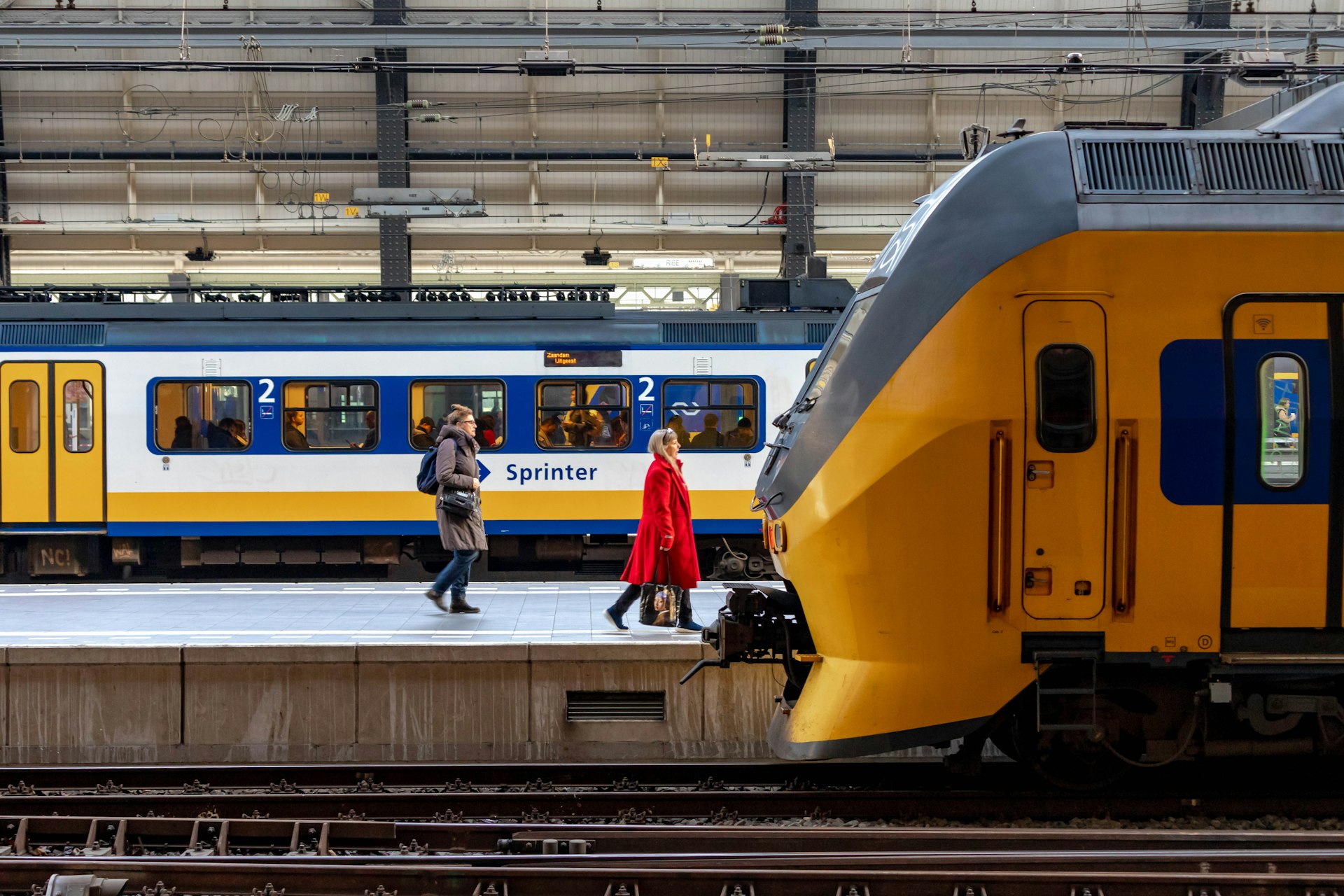
Trains are ideal for covering distances quickly
The backbone of the Netherlands’ public transport is its superb rail network. Most lines, including the major routes, are operated by the national train company, NS ( Nederlandse Spoorwegen ), which handles all scheduling and fares. Dutch trains are modern and comfortable, and the service is reliable and frequent across the country.
In addition to regular services, high-speed Intercity direct trains operate between Amsterdam , Schiphol Airport, Rotterdam and Breda, with a supplement between Schiphol and Rotterdam. A supplement is also charged for domestic travel on the Amsterdam-Utrecht-Arnhem route aboard ICE International trains.
Medium and large railway stations have a full range of amenities but smaller stations often have no services at all, not even a staffed ticket window (tickets, if not prepurchased, are available at vending machines; more information on ticketing later).
Bringing a bicycle on NS trains is possible in off-peak hours (9am to 4pm and 6.30pm to 6.30am Monday to Friday, plus all day on weekends, public holidays and during July and August). In addition to your fare, you’ll need to pay €7.50 for a fietskaart dal (off-peak bicycle ticket) .
Buses are handy for regional explorations
Part of the Netherlands’ integrated transport system, buses are good for short distances and filling the gaps in the rail network. This is especially true in parts of the north and east of the Netherlands where trains are infrequent or nonexistent.
Ferries offer scenic voyages in some areas
Ferries ply the waters in a number of local areas. You can travel from the mainland to the island of Texel and the Frisian Islands , and some inter-island ferry services link the most populous islands in the summer season.
In Zeeland, in the Netherlands’ south, passenger ferries operate on the Westerschelde . The Waterbus is a fast ferry service that operates between Rotterdam and Dordrecht and to destinations such as Kinderdijk’s historic windmills. Other minor services also provide links across the country’s canals and waterways.
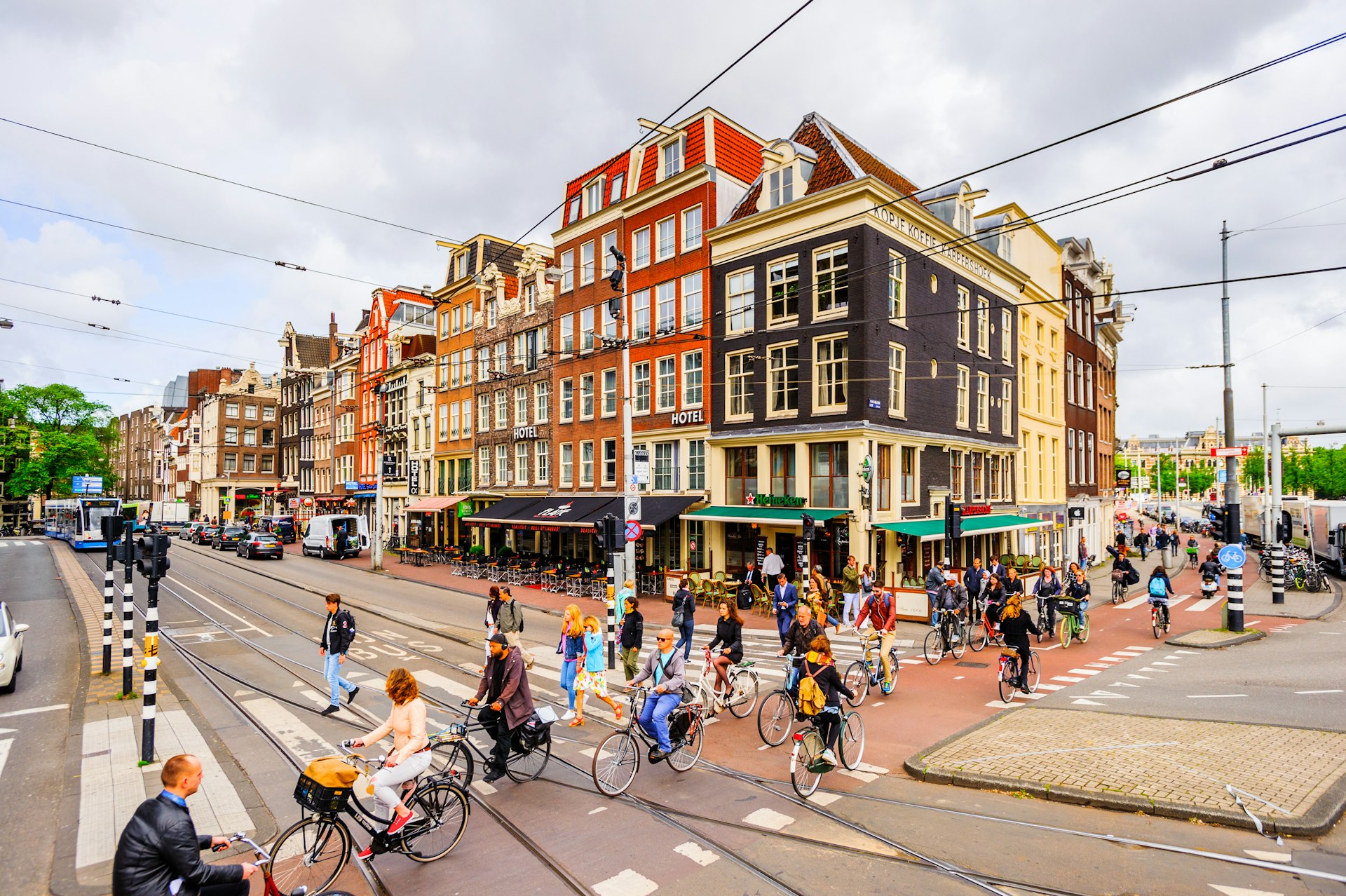
Cycling is an easy and exhilarating way to explore the Netherlands
To roll like the Dutch do, hop on a fiets (bicycle). With its flat, often beautifully scenic landscapes, mild maritime climate and outstanding cycling infrastructure, the country is prime for exploring on two wheels. You’ll find rentals at most train stations and in towns and cities countrywide.
For short distances and day trips, the fietsknooppuntennetwerk (cycle junction network), made up of knooppunten (junctions, i.e. “nodes”) where cycle routes converge, is easily navigable. Route-finding apps include the Fietsersbond Routeplanner .
For long-distance cycling journeys, check out the Landelijke Fietsroutes (LF routes), which continue to expand and are downloadable on a handy app . Helmets aren’t mandatory in the Netherlands but can be a literal life-saver; you can hire them from bike rental outlets.
Driving lets you reach out-of-the-way locations
The state-of-the-art Netherlands infrastructure means smooth, easy-to-navigate roads. Traffic can be heavy on major freeways and around the bigger cities, however, and parking can be scarce and expensive (and perilously close to canals).
Parking meters typically require you to type in the license plate and pay by credit card or a mobile app. Around bigger centers, a “Park & Ride” car park is generally your best and cheapest option. Always be mindful of wide bike lanes when driving and watch out for cyclists!
How to buy public transport tickets
Tickets for the Netherlands’ public transport system are charged according to the distance traveled and can be purchased in several ways.
E-tickets (printable) and mobile tickets (downloadable to your phone/NS app) can be purchased from NS online – you access the gates by scanning a QR code on your phone. Buy carefully as they aren’t refundable. An alternative is buying tickets on the Trainline website , which adds a booking fee but permits refunds up to the day before travel.
For single trips, you can buy a disposable OV-chipkaart (which incurs a €1 surcharge per journey on top of the standard fare). For multiple journeys, you can buy a reusable OV-chipkaart or use OVpay (while a new digital OV-pas is being rolled out this year, the OV-chipkaart system will remain in use until at least 2025).
With an OV-chipkaart or OVpay, it’s important to hold it against the reader to “check in” when entering transport and “check out” when exiting (or forfeit your deposit).
A reusable OV-chipkaart costs €7.50 and is valid for five years. You then load it with credit at ticket machines. There’s a minimum €10/20/4 for buses/trains/other forms of transport such as trams, which is held as a deposit during your journey and the balance refunded afterward. These reusable cards are automatically activated if bought from NS stations, otherwise, you may need to activate it for “pre-paid travel without NS subscription” at train station ticket machines or service desks.
An alternative to a physical OV-chipkaart is OVpay, using a contactless debit/credit card (Maestro, V PAY, Mastercard or Visa only) to “check in” and “check out” of your journey. The upside is saving the cost of the reusable card or disposable card surcharge, the downside is only being able to track the fare in your card/bank statement (tallied and charged once per day).
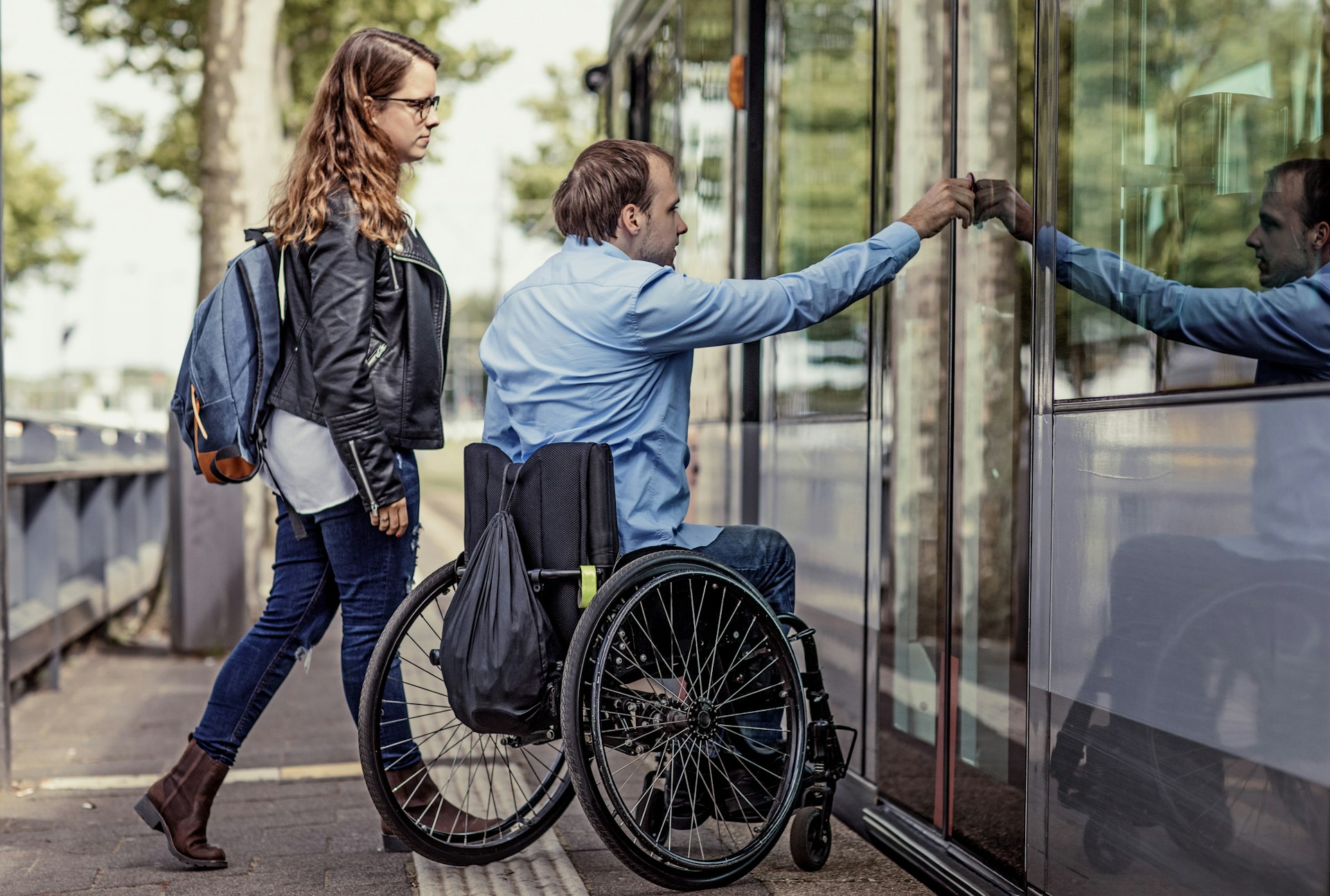
Accessible transportation in the Netherlands
The Netherlands is committed to making all of its public transport accessible for people living with disabilities in the near term and is making sound progress. Already, most buses, ferries, trams, metros and trains have wheelchair ramps, wide-opening doors and/or level platforms, designated wheelchair places and priority seating, and wheelchair-accessible onboard bathrooms for longer services.
National train operator NS offers travel assistance at over 100 stations throughout the Netherlands. In smaller destinations, it’s worth checking with tourism authorities before you travel to assess transport suitability.
Tourist passes can be a straightforward, money-saving option
A simple and often cost-effective way to use the Netherlands’ public transport system is with a tourist day ticket.
A Holland Ticket, despite its name, covers the whole of the Netherlands (not just the provinces of North and South Holland). The standard Holland Travel Ticket (€70) gives you unlimited travel by train, bus, tram and metro any day of the week, including peak hours. A cheaper off-peak Holland Travel Ticket (€48) can be used on weekdays before 6.30am and after 9am, and all day on weekends and public holidays. It’s sold at NS ticket machines, service desks and online.
If you’re sticking to one area, look for tickets such as the Amsterdam Travel Ticket or wider Amsterdam & Region Travel Ticket (including trains to/from Schiphol airport), or the Tourist Day Ticket for South Holland , around Rotterdam, Delft, Den Haag and Leiden, covering all transport including Waterbus services.
Keep planning your trip to the Netherlands:
Use your tourist day ticket to explore our pick of the best places to visit Check out the Netherlands' social calendar and pick the best time for your visit Start planning your must-see list now with our round-up of the top things to do in the Netherlands
Explore related stories

Destination Practicalities
Jul 14, 2023 • 7 min read
Amsterdam's compact center is easy to explore on foot and its public transport takes you even further. Here's how to get around the Dutch capital.

Jul 14, 2020 • 4 min read
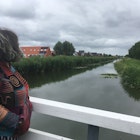
Oct 25, 2019 • 3 min read

May 21, 2024 • 11 min read

May 14, 2024 • 7 min read

May 13, 2024 • 7 min read

May 4, 2024 • 4 min read

May 2, 2024 • 5 min read

Apr 17, 2024 • 8 min read
- Search How can we help you? Search
Working abroad. Choose your country.
If you want to work abroad, you will usually need a visa or work permit. You should also look at what will happen if you lose your job or are unable to work due to sickness or disability.
- Afghanistan
- American Samoa
- Antigua and Barbuda
- Bosnia and Herzegovina
- British Virgin Islands
- Brunei Darussalam
- Burkina Faso
- Cayman Islands
- Central African Republic
- Congo (Democratic Republic of the)
- Cook Islands
- Côte d'Ivoire
- Czech Republic
- Dominican Republic
- El Salvador
- Equatorial Guinea
- French Guiana
- French Polynesia
- Guinea-Bissau
- Liechtenstein
- Marshall Islands
- New Caledonia
- New Zealand
- North Korea
- North Macedonia
- Palestinian Territories
- Papua New Guinea
- Philippines
- Puerto Rico
- Russian Federation
- Saint Kitts and Nevis
- Saint Lucia
- Saint Vincent and the Grenadines
- Sao Tome and Principe
- Saudi Arabia
- Sierra Leone
- Solomon Islands
- South Africa
- South Korea
- South Sudan
- Switzerland
- Syrian Arab Republic
- Timor-Leste
- Trinidad and Tobago
- Turkmenistan
- Turks and Caicos Islands
- US Virgin Islands
- United Arab Emirates
- United Kingdom
- United States of America
- Vatican city
- Wallis and Futuna
Also useful
- Checklist moving abroad
- I am going to live and work abroad. How will this affect my health insurance?
- Working abroad with a Dutch qualification

IMAGES
VIDEO
COMMENTS
If you want to work and travel in the Netherlands, the ease of getting the entry visa depends on where you're from. European Union (EU) citizens can enter, stay, and work in the Netherlands for an indefinite period, although Brexit may impact this for UK citizens in the future. Citizens of North America, Japan, South Korea, Australia, and New ...
This means that you need to travel to the Netherlands and have an appointment with the IND within 90 days from the date of issuance of this pre-registration letter. ... With your residence permit for WHP/WHS, you are therefore only allowed to carry out work of an incidental nature in order to support your holiday financially. More information.
Ministry responsible. Coming to the Netherlands for work? This personalised overview explains what you or your employer will need to arrange and be aware of if you are coming to the Netherlands for work.
Work and travel in Netherlands with one of Worldpackers exchange programs! Help our hosts in exchange for free stay and save money while exploring this beautiful destination. Discover the local culture and make your gap year unforgettable by travelling with Worldpackers! Worldpackers. EN. EN - English PT - Portuguese
Choose your plan to travel with Worldpackers as many times as you like. Complete your profile, watch the video lessons in the Academy, and earn certificates to stand out to hosts. Apply to as many positions as you like, and get in contact with our verified hosts. If a host thinks you're a good fit for their position, they'll pre-approve you.
If you want to work in the Netherlands, you must meet certain requirements. Check these requirements and the steps you need to take. Looking for work in the Netherlands. For information in various languages about working in the Netherlands visit the website werk.nl. For example for information about websites where you can search for work.
Choose your plan to travel with Worldpackers as many times as you like. Complete your profile, watch the video lessons in the Academy, and earn certificates to stand out to hosts. Apply to as many positions as you like, and get in contact with our verified hosts. If a host thinks you're a good fit for their position, they'll pre-approve you.
Foreign citizens wishing to work in the Netherlands have to meet various requirements. People from outside the European Economic Area (EEA) and Switzerland often need a work permit, of which there are 2 types: a tewerkstellingsvergunning - TWV (work permit) and a gecombineerde vergunning voor verblijf en arbeid - GVVA (combined residence and work permit).
If you come to work and live in the Netherlands, there is a lot to arrange. This website explains your rights and obligations, what you need to arrange and what agreements you have to make. The information will help you to live and work here healthily, safely and fairly. The website also provides links to the correct organisations to help with ...
Visa and residence permit. One place for all information from the Dutch government about work in the Netherlands. If you are traveling or living, working or studying outside the Netherlands.
Great Pyrenees, home and garden care in a village near The Hague, Netherlands. Accommodation & Meals - 25 hours per week. Accommodation Only - 15 hours per week. *You provide your own food/drinks; there is access to a fully fitted kitchen, utensils, porcelain etc. Duvets, sheets and towels are provided.
Working holiday residence permit. Last update: 19 February 2024. A working holiday is a cultural exchange programme or scheme (WHP or WHS) for young people aged 18 to 30 from certain countries. The main purpose is to get to know Dutch society and culture. Find out what the requirements are and how to apply for the residence permit.
Do you wish to earn over €12,000 💰 in six months and get to know the Netherlands? Come and work with us at Amsterdam Schiphol Airport. 6.7 mil. euros paid to participants in our programme (2021) 15. Official employers. 2,000+ Work agreements concluded. 8+ ... Still hesitating to travel? ...
To work in the Netherlands through the Netherlands-Canada Youth Mobility Agreement, you must: be a Canadian citizen. be 18-30 years old (inclusive) for the Working Holiday program. be 18-30 years old (inclusive) for the Young Workers Exchange program. live in Canada when applying, and. have a valid Canadian passport. Other requirements may apply.
Visa and work permit. One place for all information from the Dutch government about work abroad. If you are traveling or living, working or studying outside the Netherlands.
Regular weekly wage ( earnings from €2,000 /month depending on hours worked) Dutch labour law benefits and collective agreement system (up to 200% for holidays, 130-150% for weekends, 125% for nights, + 8% "holiday money" of the total amount earned after the end of the job) Guaranteed start within three months since your application date.
5. You need to prepare well in advance. Preparing in advance is key if you're planning on working and living in the Netherlands. Sorting out that work visa should be at the top of the list (if you're an EU national, you can skip this step; you're all good).
You are travelling from a high-risk area: you may travel to the Netherlands. If you are 12 or older you must have a Digital COVID Certificate (proof of vaccination, proof of recovery or negative COVID-19 test result). You do not need to self-quarantine. You are advised to get tested or take a self-test after you arrive.
Dutch visas for self-employed, freelancers, and entrepreneurs. If you come to the Netherlands to start your own business or work as a freelancer, you can apply for a visa/permit as a self-employed person. This is valid for up to two years, costs €1,446, and is renewable if the business is a success.
Work in the Netherlands (Canadians Only) Spend a few months working and traveling in the Netherlands! These are paid positions with an arranged work permit and accommodations. Take on full-time seasonal work for 3 to 12 months.Placements center around primarily agriculture and horticultural work.
Unemployment, sickness or incapacity for work when abroad. If you work abroad and lose your job, get sick or are unable to work, check whether you are insured and whether you can receive a benefit outside the Netherlands. Read more about an incapacity benefit abroad; Read more about an unemployment benefit abroad; Read more about a sickness ...
Call us in Washington, D.C. at 1-888-407-4747 (toll-free in the United States and Canada) or 1-202-501-4444 (from all other countries) from 8:00 a.m. to 8:00 p.m., Eastern Standard Time, Monday through Friday (except U.S. federal holidays). See the State Department's travel website for the Worldwide Caution and Travel Advisories.
Navigating the Netherlands is a breeze. Its compact size means there are no domestic flights and the efficient, highly integrated public transport network of trains, buses and ferries covers all corners of the country. The flat terrain and extensive bicycle paths lacing the country also make it possible to travel around entirely on two wheels.
Choose your country. If you want to work abroad, you will usually need a visa or work permit. You should also look at what will happen if you lose your job or are unable to work due to sickness or disability. Fill in your country or region. Dutch nationals usually need a visa and work permit to work outside the EU.